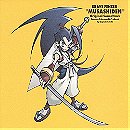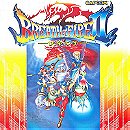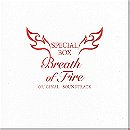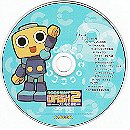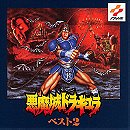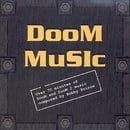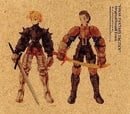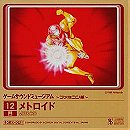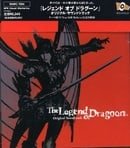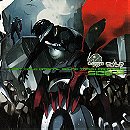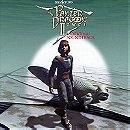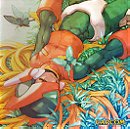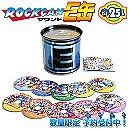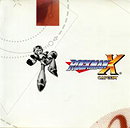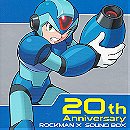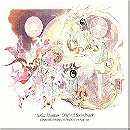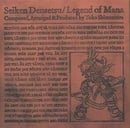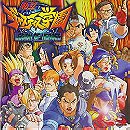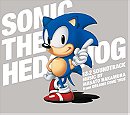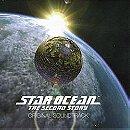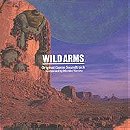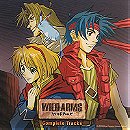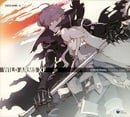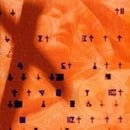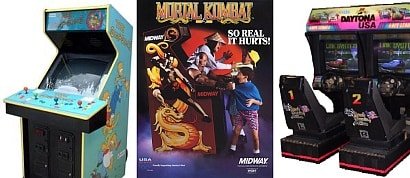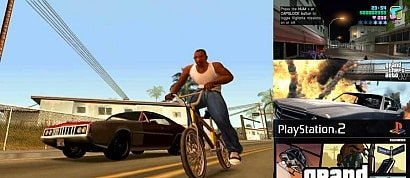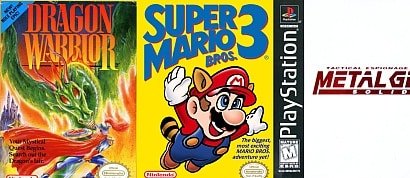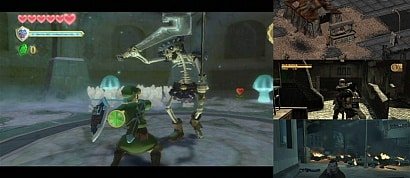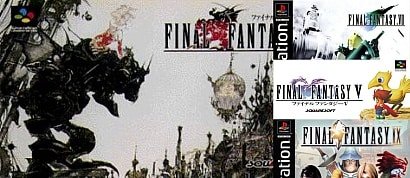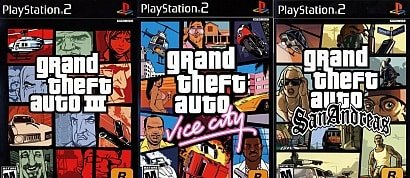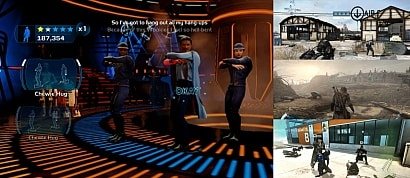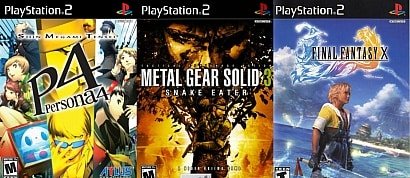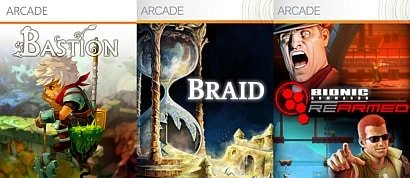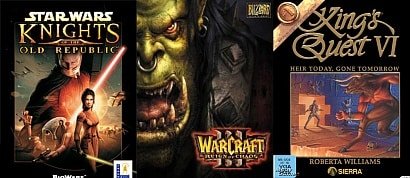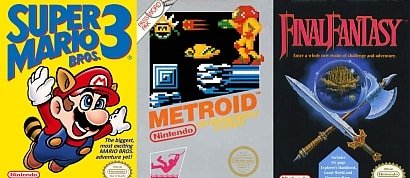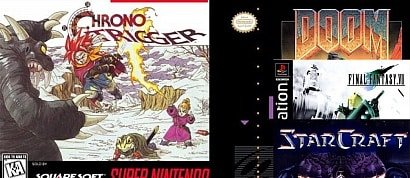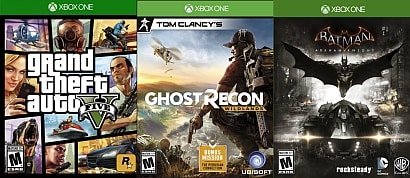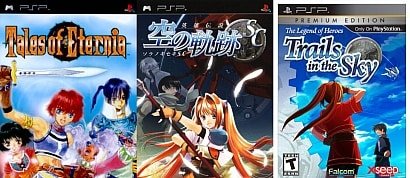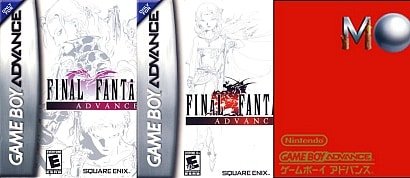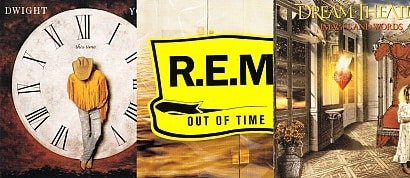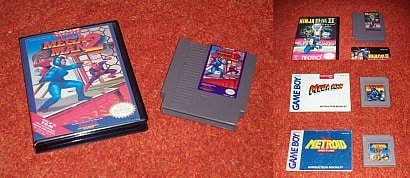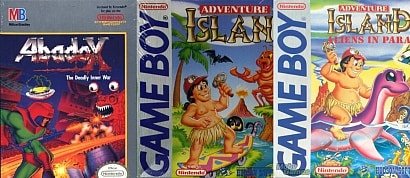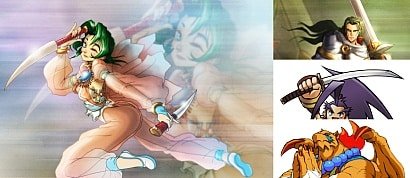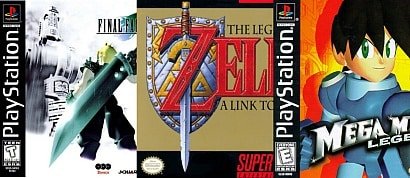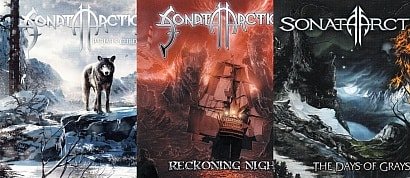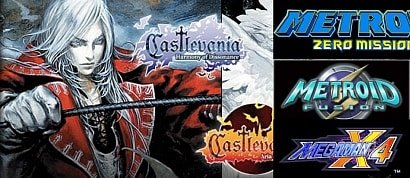Video Game Soundtracks
Sort by:
Showing 34 items
Rating:
List Type:
Biohazard 2 Original Soundtrack - Masami Ueda, Syusaku Uchiyama, Shun Nishigaki, Naoshi Mizuta

(CPCA-1001) Added to Collection: 05/25/07
Overall Thoughts
Oh dear, what can I possibly say about Resident Evil 2? The better question is what can't I say. When I was a teenager I played the ever living hell out of this game when it came out... and I knew the game so well I could complete any of the four main scenarios in one sitting without saving. Now that's dedication! However, such "dedication" really had an adverse affect in that I haven't touched the game in years. Yeah, I'm still burned out not only on this game but on the franchise in general, and no, not even the reinvention of the series with RE4 did anything to coax my interest out of its self-induced hibernation.
Unfortunate as that may be, I will always love the game and remember how Resident Evil 2 used a light touch when making improvements over the original which made it that much better of a game. Such flattery aside, out of all the elements that made up the first and second games, I've always felt that in-game audio perhaps received the greatest boost in quality when the sequel came out which this one disc album has no problem proving.
(Author's Note: As odd as it may seem, I want to point out - just in case someone reads above and feels I'm saying Resident Evil 2's music being better than the original game's music is an automatic fact - this is not what I'm saying. I know there are some video game music fans that really enjoy the score for the original Resident Evil. However, while I have respect for that music, I personally find it a little unrefined, which makes this soundtrack one of the only areas Resident Evil 2 greatly improved upon the original game in my opinion.)
What You Should Know
In reality there are two versions of the Biohazard 2 soundtrack: this one disc rendition (CPCA-1001) that lacks the music used for the game's full motion videos and the Biohazard 2: Complete Track (CPCA-1011) which contains those tracks for those who are looking for the complete package. There are also various (non-Japanese) releases for the former one disc rendition.
Looking for a Copy
The Japanese renditions of the two Biohazard 2 soundtracks have been out of print for some time given that they were some of the first soundtracks released through Capcom's music subsidiarity Suleputer back in 1998. The albums have become more difficult to come across but the one disc version was also released abroad by Viz Music and Pioneer LDCE under the series' Americanized name around the game's release. These versions (which have the same exact music despite the track listing being slightly rearranged to make a little more sense) sell for a mere fraction of the Suleputer print on the second hand market. If you're not too worried about what print you're getting and just want the music you shouldn't have any problem tracking down a copy. Just don't be fooled in giving up a lot of money for one of the localized variants when that kind of money should only be applied to the Japanese original.
However, if you really enjoy Resident Evil music, you might just want to forgo purchasing the solo album(s) for this game and obtain the Biohazard Sound Chronicle Best Track Box (CPCA-10104~9) which is a six disc set spanning this game's audio and that of the other games in the series.
Who should pick this up?
The obvious answer to this question would be Resident Evil 2 fans... but this soundtrack's excellent mix of ambient and straight-laced compositions is a wonderful jumping off point for horror music fans to decide what they're looking for within this subsection video game music. For example, if you find the ambient tunes more to your liking, you might want to check out/cross over to horror scores like those from the Silent Hill games.
Brave Fencer "Musashiden" Original Soundtrack... - Tsuyoshi Sekito, Yoichi Yoshimoto

(SSCX-10022) Added to Collection: 01/14/08
Overall Thoughts
Perhaps more than any other soundtrack on this list fate has dealt the Brave Fencer Musashi Original Soundtrack an insanely raw deal. Still, as much as I lament the lack of appreciation it receives in general it’s not hard to see how such a situation came about.
Like a lot of other gamers out there I hold a very deep and positive view of Squaresoft's output during the era of the original PlayStation. I won't sit here and say it was all gold (people, get it through your heads, Xenogears is not a perfect ten) or that it has all aged well (Parasite Eve needs a remake bad) but I personally believe from an overall standpoint that the company experienced no better era. Of course this all came crashing down when the life-saving Enix merger came about because of The Spirits Within but many of Square's 32-bit titles are still revered. This isn't exactly the case with Brave Fencer Musashi. In fact, many people purchased the game just to obtain the playable Final Fantasy VIII demo on the second disc. Some of these people completely ignored that a pretty fine game accompanied that demo and thus severely limited the game's place among Square's products when looked at retroactively.
The game's loss ended up being the soundtrack's loss as well as because while it isn't very common due to being out of print it simply isn't sought after to the level of other Squaresoft scores. Perhaps even more disappointing is what was ahead for Tsuyoshi Sekito in the decade following this work. Rather than give Sekito the lead composing job for another game the man would spend the next decade+ as an arranger, reworking the work of other prominent composers. I won't sit here and say that everything on the Brave Fencer Musashi soundtrack is flawless but the material easily influences me into saying he deserved more than that.
(Author's Note: Sekito did get another chance at composing with 2008's The Last Remnant. So yeah, it took about a decade :P)
What You Should Know
The two disc soundtrack (SSCX-10022) contains 78 tracks over two compact discs. However, the soundtrack does not contain all the game's music with about one-third of the in-game music not making the cut. Personally I hate when this kind of thing happens (see many of the soundtracks below) but whoever was in charge of the album's layout did a very nice job. Most of the missing tracks (like those used for mini-games and dialog sequences) are very inconsequential in the scheme of things and the more prominent themes are all accounted for. These omissions allow the album to flow from track to track much easier when listened to as a whole.
Looking for a copy?
As stated above the Brave Fencer Musashi Soundtrack is out of print and the original DigiCube pressing is all there ever may (e.g. will) be. Unlike other soundtracks there most likely isn't enough demand to get Square-Enix to spring for a reprint of this album. This means you will definitely have to scour the second hand market for a copy. There's good and bad news about this. The bad part is the album doesn't show up for sale too often but on the plus side the lack of a big market means you (hopefully) won't have to break the bank to buy it. I was able to score my copy (complete, near mint) for a mere $15 on eBay. That's quite the exception and far from the rule... but recently I've seen people jacking the price on this one up to the one-hundred dollar mark even though the demand doesn't really warrant it.
Who should pick this up?
Personally I would recommend this score to anyone who has an above average interest in video game music (or Squaresoft/SquareEnix music) and loves adventurous tunes... but at the end of the day suggesting such an open-wide demographic isn't really going to help anyone given how obscure the soundtrack can be. As much as I hate to admit it only those still enamored with the game are going to be a good fit for this one even though the music does deserve more of an audience.
Ashley Winchester's rating:


Breath of Fire II -The Destined Child- - Yuko Takehara

(SRCL-3119) Added: 08/22/14 (first copy bought back in 2008)
Overall Thoughts
In a certain sense it's really hard to explain how Capcom's Breath of Fire II ended up becoming such an important game to me. Granted it was one of the first RPGs I ever played but in general it's not hard to see how other products, even products that debuted during its own time, outgunned it. Despite that it still managed to worm its way into my heart... which sounds like a seriously frightening medical condition :(
However "outgunned" is exactly how I would describe Yuko Takahara's work in Breath of Fire II. The soundtrack is an improvement over the one penned for the original game (and the synth quality is much more streamlined this time around) but when listening to her work outside the scope of the game it simply doesn't have the clout to keep up with other, all encompassing role-playing scores. Because of this and my belief that Breath of Fire II is somewhat similar to Final Fantasy VI in that it is a very character driven game (seriously, think about it) I often refer to Breath of Fire II and its elements as "the poor man's Final Fantasy VI."
Okay, now I'll admit that is not a complement in any way, shape or form but I think it does summarize the situation that the game finds itself in. Take away the great Capcom art, the storyline that is deliciously critical of organized religion (and the NPCs that strangely parallel the actions of people in real-life faiths) and the rock themes used for boss battles and you have a pretty textbook game if there ever was one. Heck, even with those things Breath of Fire II is still pretty basic but the fact remains that it worked and had a profound effect on me as a player back in the SNES days.
What You Should Know
At one disc Breath of Fire II -The Destined Child- (SRCL-3119) only contains about half of the game's music. What's ironic about this is the 2006 release of the Breath of Fire Original Soundtrack Special Box (which includes the music of Breath of Fire II) proves that *most* of the game's music would have fit on one CD despite it being on two CDs in that collection. The other important thing is the volume of the tracks on this CD is lower than the rendition on the Special Box (known by many as "the loudness war") but the fade outs on this album are quicker and more precise. Even crazier is the fact that Capcom still missed out on recording some tracks from this game the second time around.
Looking For a Copy?
As you'd probably expect for an album released in 1995 the original rendition of the Breath of Fire II soundtrack is long out of print. Copies are far from common and finding a copy that's in good condition and complete can be a challenge. I can personally attest to this because the first, incomplete copy I had didn't include the OBI. Because of this may you may opt to bypass it and pick up the Original Soundtrack Special Box to obtain the missing tracks and the benefit of the higher recording volume... but even that has become a problem in and of itself in recent years. Most retailers sold their last remaining copies of the Special Box long ago and now jump at the chance to sell second hand copies at two or three times the original price. When you consider that the box debuted at around $150 it's a pretty significant mark up only the most die hard fans will break down and pay.
Who should pick this up?
When it comes to the original, one disc version of the Breath of Fire II soundtrack only the biggest fans of the game (or Yuko Takehara) should take up the challenge of finding a copy. While it's true that as a release it is not really sought after (like some of the later soundtracks on this list) it is uncommon, especially on this side of the pond. Unfortunately, I kind of have to say the same for the Original Soundtrack Special Box as well given how its price has exploded in recent years but in that case you're getting five soundtracks instead of one. Still, I don't think that would make that $500 to $600 dollar pill any easier to swallow.
Breath of Fire Original Soundtrack Special Box... - Yasuaki Fujita, Mari Yamaguchi, Minae Fujii, Tatsuya Nishimura, Yoko Shimomura, Yuko Takehara, Akari

(CPCA-10146~56) Added to Collection: 02/26/10
Overall Thoughts
Born out of the atonement that the Mega Man and Mega Man X boxes provided their given franchises in 2002 and 2003 the Breath of Fire Original Soundtrack Special Box seeks to correct similar injustices that befell yet another beloved Capcom property. Containing the soundtracks to Breath of Fire, Breath of Fire II, Breath of Fire III, Breath of Fire IV and Breath of Fire: Dragon Quarter, it's an impressive product whose attractiveness is, somewhat ironically, limited by its gargantuan size and availability.
Breath of Fire
Unlike the last time I sat down and wrote something about the Breath of Fire section of the Special Box I now have the experience of playing the actual game to back up my opinion. The bad news is the game didn't really alter my opinion that the soundtrack is a little overbearing with its regal flavor and synth quality. With four (well-known) composers backing this one I was expecting more but to ignore its importance in the scheme of things (the epic vibe cultivated here is the basis for Yuko Takehara's work for the second game) would be foolish considering this is its first appearance on officially licensed CDs.
Breath of Fire II
As stated above Yuko Takehara's work on Breath of Fire II is pretty important when it comes to my past experience with the game... but it has a hard time standing up to it contemporaries in the genre. Still, the most important thing about the soundtrack is that it carries on the sound forged in the first game because that sound is eventually discarded in the following games due to the initiatives of Akari Kaida and Yoshino Aoki.
Breath of Fire III
In video game music circles Breath of Fire III is pretty famous in that it gives the middle finger to the regal sound of its predecessors in its attempt to prove that a jazz oriented score can define a role-playing game. Most video game music enthusiasts have little to no problem eating up this vision of Akari Kaida and Yoshino Aoki's... but most people who reviewed the game back when it was released weren't so welcoming. As for me? I'm a little on the skeptical side with this one even though I'll admit there are some great tracks here. The main problem is a lot of music is very situational and taking it out of context doesn't do it the biggest favor. In the end I don't think Breath of Fire III proves that jazz oriented score is capable of depicting the world in an RPG but rather proves it can survive the attempt.
Breath of Fire IV
Co-composer Yoshino Aoki from Breath of Fire III returns to compose the music for the fourth Breath of Fire. As if things weren't complicated enough already, Aoki ambitions take the series' music in even more diverse directions with the addition of ambient themes. The contrast between the western and eastern flavors used to portray the game's protagonist and antagonist is well executed but does little to hide how dry the game's narrative is. Because the music reminds me of one of the biggest issues I have with the game it's not an experience I revisit too often even though there is nothing wrong with it.
Breath of Fire: Dragon Quarter
I have little doubt that many people are going to find my opinion of Dragon Quarter's music more malicious than respectful. Being the only score that wasn't produced by an in-house Capcom composer, coupled with the fact the experience the game offers is miles away from what the first four games presented, I personally wish this score was omitted from the box and the individual, standalone soundtrack (which includes all the music and still available from some online retailers despite its age) was reissued instead.
Given such a divisive view some will obviously wonder if I have a vendetta against Hitoshi Sakimoto and his work. I will admit I'm not the biggest Sakimoto fan out there (just give me the Final Fantasy Tactics soundtrack and I'm golden) but the real issue here is the music, while good enough, just doesn't make much of an impression without knowing the context. So yeah, this could completely change once I actually get around to playing the game... but I have absolutely no clue as to when that will end up happening.
What You Should Know
This eleven disc behemoth (CPCA-10146~56) still doesn't contain *all* the franchise's music. There are still tracks omitted from the first three soundtracks slight as they may be. The remaining two soundtracks (IV and Dragon Quarter) are complete as they are carbon copy reproductions of their original soundtracks. Breath of Fire II also contains a higher recording volume than the original 1995 pressing and, last but not least, many suspect the three disc rendition of Breath of Fire III's soundtrack was ripped from the PSP version of the game rather than the PlayStation original even though the additional "unused" tracks kind of fight against that idea.
Looking for a Copy?
In updating this list from its original 2012 incarnation this is one of the more painful entries to write. When I wrote this you could actually find new copies of the Breath of Fire Original Soundtrack Special Box for sale. That is no longer the case. Well, I'm sure someone out there has a sealed copy squirreled away but I could only imagine how much they would want for it. Used copies aren't much better with many retailers wanting $500 to $600 for them which is, let's be honest, a bit insane.
Who should pick this up?
Given its price on the secondary market these days it's kind of hard to recommend the Original Soundtrack Special Box to anyone. However, to be fair, I found it hard to recommend the box even back when it was at the original $150~160. Why? I can't even begin to deny that there are some great tunes within this set yet at the same time there is just so much material to sift through... and a good chunk of that material is, in my opinion, better within the confines of its given game. So if you assume I'd only recommend this to the biggest Breath of Fire fans out there you are right on the money.
Ashley Winchester's rating:


Capcom Music Generation Famicom Music Complete Works: Rockman 1~6... - Manami Matsumae, Takashi Tateishi, Yasuaki Fujita, Minae Fujii, Mari Yamaguchi, Yuko Takehara

(CPCA-1064~6) Added to Collection: 11/13/07
Overall Thoughts
Given that Mega Man 2 was the game that spearheaded my interest in console video games (and later on video game music) there was little doubt that these games would go unrepresented in my collection. Containing the soundtracks to the first six Mega Man titles on the Nintendo Entertainment System, Capcom Music Generation Famicom Music Complete Works: Rockman 1~6 (CPCA-1064~6) is the first in a line of several boxes produced by Capcom's record label Suleputer ("Suleputer" being the other half of "Capcom" or "Capsule Computer") to amend the lack of official soundtrack releases in 2002.
This set was a dream come true for many Mega maniacs back it was released and is a great way to enjoy these scores... however, over the years Capcom has re-released all the music of this set in bigger, much more encompassing sets although because of some small, irksome oversights (read below) some still prefer this option over the others.
Mega Man
Personally I have very mixed feelings towards Manami Matsumae's score for the original Mega Man. This probably stems from the fact I'm perplexed by the impersonal feel the game has to this day when compared to most of its sequels. Still, as one would expect, Matsumae's work not only lays the groundwork for future Mega Man games but lays out the formula that fueled new spin-offs like Mega Man X. Important as that is the score for Mega Man is almost consumed by its depressing aura (there are a few anomalies like Cut Man in there among others) but there is obviously a lot of room for improvement.
(Author's Note: As crazy as it seems, I feel the track that Matsumae wrote for Mega Man 10 [Nitro Man's Stage] is actually better than this entire soundtrack put together.)
Mega Man 2
I know some people might be a little stunned by what I have to say about the music in Mega Man 2 but over the years I've come to feel that Takashi Tateishi's soundtrack has kind of entered the realm of overrated works. I can't deny that it was the first video game score that grabbed my ears and made me realize that VGM was more than a disposable part of the backdrop that made up a game but it has received so many accolades there is really no reason to try and talk it up these days. In the end it's still a highly important score to me and others but I'd rather talk up other scores that have received less attention.
Mega Man 3
I like the score for Mega Man 3 more than I like the game itself (which is home to some very aggravating flaws in my opinion) but at the same time the music in Mega Man 3 only contains a small amount of formulaic progression over that in Mega Man 2. This isn't to say it falls behind or that the Mega Man style needed to evolve, its just that the score for Mega Man 4 is the turning point (the good kind of turning point) that Mega Man 3 could have been. That said, there still are plenty of great tracks by Yasuaki and Harumi Fujita to be experienced with this one.
Mega Man 4
As was stated above the music of Mega Man 4 represents a significant turning point for the audio of the NES-based Mega Man titles. Still, while Minae Fujii's ideas don't quite forge a new paradigm for the series the concepts at play are more than capable than showing off their increased girth - something they and future tunes take all the way to the bank. Important as that may be in the scheme of things there are many other "firsts" Mega Man 4 is known for - like the birth of what would become the go-to fanfare for defeating a robot master.
Mega Man 5
Unlike the past where it fell slightly behind the rest of the pack I can safely say that I find Mega Man 5 to be an interesting game. "Interesting" isn't the same as "instrumental" but there's definitely a strange sense of reserved maturity that resides within Mega Man 5. As you can pretty well guess, that maturity also exists in Mari Yamaguchi's music. As impressive as that may sound this quality doesn't do much to push it ahead of other Mega Man scores.
Mega Man 6
While some may question my opinion, I can't help but feel a little sorry for the music of Mega Man 6. Well, a lot of that has to do with the game itself, which Nintendo brought over to the states rather than Capcom themselves, but in being the last of its kind on a fading piece of hardware it's not hard to see how many overlook what Yuko Takehara (Breath of Fire II, Star Gladiator) has to offer here. Still, while the franchise may have been plugging away at the same old game Capcom's composers were still more than capable of bringing these games to life musically.
What You Should Know
This three disc set from Suleputer is a Mega Man music lovers dream. These six NES scores (two per disc) come across crystal clear and aren't subject to the same warts that are found in the cart-based SNES Mega Man X scores in the Capcom Music Generation: Rockman X1-6 box. Throw in the quality Japanese goods are known for and you have a gaming artifact you can be proud of.
However, things got kind of convoluted when the Rockcan Sound E Can (CPCA-10264~73) came out in 2012. All six scores were remastered for the eCan (thus the music sounds louder and clearer) but Capcom unfortunately screwed up the mastering on the discs that contained the music for Mega Man and Mega Man 2. The higher peaks in instrumentation on these soundtracks are somewhat distorted even at low volumes meaning that those scores are *technically* superior in this set even with the lower recording volume... although it really is a matter of opinion. With the Rockcan Sound E Can being re-released as the Rockman Sound Box Vol.1 this October (2014) many are waiting to see if Capcom has re-recorded Mega Man 1 and 2 making it the final and highest quality rendition of the music.
UPDATE: Unfortunately, I received word that the scores for Mega Man and Mega Man 2 have NOT been corrected on the recently released Rockman Sound Box Vol.1 and is a note for note copy of the Rockcan Sound E Can flaws and all. Anyway, I'm disappointed in that but at least I don't have to buy another rendition of something I already own.
Looking for a Copy?
While it has been in print for quite a long time, finding a new/sealed copy of the Capcom Music Generation Famicom Music Complete Works: Rockman 1~6 (CPCA-1064~6) isn't as easy as it once was. Well, that's not necessarily true. It's not really hard to locate a copy, what IS hard is finding a copy where the seller doesn't want to charge an arm and a leg for it compared to the price it sold for initially. Capcom doesn't seem to be producing the set in the numbers it once did, so people are taking advantage of the situation. If you go the second hand route don't be suckered into coughing up too much for it... there are plenty of copies in existence and in circulation. However, before you consider this set, you may want to do some research on the re-release of the Rockcan Sound E Can as the Rockman Sound Box Vol.1.
Who should pick this up?
As forward as this may sound, the Capcom Music Generation: Rockman 1~6 set is a great acquisition for anyone who has a thing for NES era Mega Man tunes or Mega Man in general. However, with the impending release of the eCan re-release as the Rockman Sound Box Vol.1 most are probably going to opt for that to obtain the music for the ten main numbered games in the franchise.
Capcom Special Selection: Rockman Dash 2 - Makoto Tomozawa

(CPDA-10061) Added to Collection: 10/29/09
Overall Thoughts
While I can't say that Mega Man Legends 2 was a truly astounding Mega Man game, I personally feel Legends 2 can tout a few claims to fame when it comes to some of its elements: storytelling (a Mega Man game that actually answers questions that arose from the previous game...! Yes, it's true!) and challenge (Legends 2 is actually much more challenging than the original) it still saddens me that some people still refuse to acknowledge the franchise's existence just because it isn't a sidescroller. I mean hell, the three games in the Legends sub-series did 3D better than Mega Man X did with Mega Man X7, right? Right?
Anyway, besides alluding to a war I will never win above, one of the even more ignored elements of the Mega Man Legends games has to be music. Unlike the original Mega Man Legends, which actually had a soundtrack release that contained about half of the music in the game there was no soundtrack release for Mega Man Legends 2. Those who have played the game may know why as the game literally had over one-hundred pieces of original music, many of which were small variations or renditions of one another. This change in composition first took hold in the prequel Misadventures of Tron Bonne and was carried over into the direct sequel despite the change in composer.
Such a situation wouldn't have made for a particularly welcoming soundtrack and well, as most people would readily point out, the Legends series wasn't really tearing up the sales charts despite the first game selling enough units to obtain the Greatest Hits status. However, there are those out there who appreciated these games and the music of Makoto Tomozawa, myself included. It wasn't until eleven years later that we got this small, seventeen track collection for Legends 2 that was released during the 2009 Tokyo Game Show.
What You Should Know
As was previously stated, with this disc you only get seventeen tracks from a game that had over one-hundred; no more, no less. Thankfully, while the selection is hit and miss, you do get what I feel are the three most important tracks in the entire game. The question here is how much are you willing to pay for those three tracks? Additionally, you also have to ask yourself how important the artbook this came with is to you as well.
Looking for a Copy?
Given that this disc was released at the 2009 Tokyo Game Show you'd think that someone on a different continent back then would have been out of luck when trying to find a copy. Yes and no. I was able to find the *disc* for sale from some Japanese retailers (note: the disc just comes in a plain-ass jewel case with no kind of cover) minus the artbook. Yeah, I don't have the artbook (although I would really like to have it) and just settled for the disc. If you'd want the whole package you're going to have to go a different, more expensive route especially now that the avenue I got the disc through isn't viable anymore.
Who should pick this up?
Considering you are going to be paying about twenty to thirty dollars (possibly even more) for seventeen tracks that only make up a little more than thirty minutes of music, you can probably guess that Capcom Special Selection: Rockman Dash 2 (CPDA-10061) is a very niche item... and it definitely is. Only the most devout Legends fans with a thing for video game music will seek this one out. But really, who could possibly resist not buying this thing when there is a damn Servbot on the disc? (I love the Servbots.)
Ashley Winchester's rating:


Castlevania: Curse of Darkness Original Soundtrack... - Michiru Yamane, Yuka Watanabe, Teshigawara, Michiru

(GFCA-34~5) Added to Collection: 04/16/07
Overall Thoughts
As undignified as it sounds for the beginning of a paragraph critiquing a product, I don't think I'll ever forget my time with Castlevania: Curse of Darkness on the PlayStation 2. An extremely unpolished game if there ever was one, Curse of Darkness wasn't gloomy in the sense you'd expect a Castlevania game to be... it was gloomy in the sense that it really had no identity, that it borrowed its combat system from the rapidly multiplying Dynasty Warriors games and offered little else. However, as is usually the case, everything comes back to the concept of identity and my belief that Curse of Darkness had one of the meekest ones of any Castlevania game to date. However, for some reason, that didn't stop me from playing and enjoying the game :P
You may wonder what this has to do with the music Michiru Yamane crafted for the game. Well, the game's meek identity really crosses over to the soundtrack as well since the music in Curse of Darkness doesn't really leap out of the speakers like previous titles. Sure, there are some bombastic numbers like boss themes, but these were far from being the tracks that lured me into buying the soundtrack. In fact I was turned off by many of those numbers. No, there's another side of Castlevania music to be heard here. It's not really as memorable or as versatile as the classic Castlevania tunes we grew up with but given enough time it will pry at your subconscious and make you realize there is something (however puzzling it may be) to be heard here.
What You Should Know
Surprising as it sounds, there really isn't a catch-22 with the Curse of Darkness Original Soundtrack (GFCA-34~5) like there is with many of the other albums on this list. The tracks aren't cut short, almost all of them double loop, and there's no technical problems. The only real thing to be aware of is the fact that Michiru Yamane can't write cut scene music to save her life. I'm totally serious. This was a real problem on the Lament of Innocence soundtrack but here she somewhat hides it by incorporating some of the area themes into these pieces and makes them more digestible.
Looking for a Copy?
I have to admit I was really surprised when I went to do the research for this section and I'm glad I took the time. I had planned to say that the album was readily available from several Japanese retailers, but it seems supplies of the album have dried up in recent years with many places listing it as out of print. However, I don't think this means you have to cough up a lot for it on the second hand market although I'm sure there are those who will try and take advantage. If purchasing second hand, make sure not to get it confused with the various, one-disc samplers of which there are a few.
Who should pick this up?
Considering I've pretty much admitted that the music included here is somewhat second rate (even for Castlevania music) I can't recommend this one to anyone who is collecting and trying to only obtain soundtracks of the highest quality. This one is for those who can find strengths in perceived faults and isn't overly critical of what they are hearing and buying. However, at the same time, I wouldn't go as far as to say this one is for risk-takers. Regardless of what kind of spin I try to put on it this one is probably for fans of the game like myself who still aren't sure why they even ended up liking the game to begin with.
Demon Castle Dracula Best 2 - Masanori Adachi, Taro Kudo, Shigeru Fukutake, Hidehiro Funauchi, Norio Hanzawa

(KICA-7902~3; reprint) Added to Collection: 05/03/14
Overall Thoughts
Despite being a big fan Castlevania, some may be caught off guard with the fact that the old-school Castlevania titles are kind of hit-and-miss with me. It really wasn't until 1991's Super Castlevania IV that the franchise really gained traction with me... although I didn't play most (any) of these games prior to playing Symphony of the Night in 1998.
Unsurprisingly, like many others, I was introduced to the franchise through its Metroidvania rebirth but went backwards to learn (and play) through its history. Most of the games included on this two-disc collection (Castlevania: The Adventure, Castlevania II: Belmont's Revenge and Super Castlevania IV) offer up some of the most ambitious soundtracks for their given consoles/handhelds and some of my personal favorites.
Castlevania: The Adventure (Game Boy)
Unlike when I originally wrote this list back in 2012, I have procured and played through (most) of Castlevania: The Adventure. Prior to this what I wrote in this section was based off the opinions of others and, to be honest, what I had written was pretty damn close to how I feel about the game having experienced it. Anyway, as most already know, Castlevania: The Adventure was met with a rather mixed reaction and the music, while respectable, is easily the weak link in this collection. Still, once presented with the music from the following two soundtracks it's easy to see why I would think in this manner.
Castlevania II: Belmont's Revenge (Game Boy)
Many players considered Belmont's Revenge to be a significant improvement over The Adventure, and this is another case where I happen to agree with the status quo. To be honest I'm not really the biggest fan of old school Castlevania when it comes to gameplay, but this was one cartridge that was worth all the green I spent on it. However, this wasn't even the best part of the experience. I already had a high opinion of this soundtrack prior to playing the game, but hearing this music in context just heightened my opinion of it to the stratosphere. One of the best best 8-bit scores I can think of, the score for Belmont's Revenge deserves to be mentioned among the highlights of the original Game Boy with Capcom classics like Mega Man: Dr. Wily's Revenge, Mega Man V and even Hal Laboratory's Kirby's Dream Land. It is easily the highlight of the album for me.
Super Castlevania IV (Super Nintendo)
Writing something for Super Castlevania IV's score is kind of tricky because when I originally wrote all this out I glossed over (i.e. completely forgot) to mention a rather significant part of my relationship with this score and game. I can't even begin to mention how impressive this progressive influenced soundtrack is, especially when I'm not the biggest fan of that kind of music (think Motoi Sakuraba here) but the problem is while I can easily boast about the score's quality this is one soundtrack I don't really like to listen to outside its original context. Yeah... I know that doesn't make a whole hell of a lot of sense but I just have some trouble digesting this one outside the scope of the game for some reason. Because of this the score for Belemont's Revenge kind of sneaks ahead when it comes to being my favorite offering on this set.
What You Should Know
Much like the soundtrack for Castlevania: Curse of Darkness above there really is no catch when it comes to Dracula Best 2 (KICA-7902~3). You get three good (two of them outstanding) soundtracks in one package and there are no formatting issues like there is with first Dracula Best album. The only real thing to note is the original print (KICA-7506~7) has some artwork that was not transferred over to the reprint.
Looking for a Copy?
While there are two pressings of Dracula Best 2, the album has been in print for a long time and it doesn't seem to be going anywhere anytime soon. Granted you'll pay more for an original print (as is usually the case with multiple prints) but there really is no reason to get an original unless it's a quirk in your personal collecting habits or you want access to the additional artwork.
Who should pick this up?
Given that Castlevania is a pretty popular with gamers and video game music enthusiasts, I don't think you can go wrong with this one. It's easy to procure and offers up three different yet related experiences. The only thing I think that could limit its appeal is if younger listeners are only familiar with Metroidvania titles or the newer Mercury Stream entries and have had little exposure to the series' origins. That said, I'd hope that classic/quality compositions like these would transcend the advances in technology to those unfamiliar with them.
Diablo II Soundtrack - Matt Uelmen

(S7100360) Added to Collection: 05/12/14
Overall Thoughts
While some might not quite get the association right away, Diablo II (and perhaps more importantly its expansion Lord of Destruction) always reminds me of 56K modems and dial-up internet. I don't want to make myself sound old or come off as cartoonish as someone like Cranky Kong from the Donkey Kong Country games, but man, I find it so bizarre I and so many others put up with that during this game's hayday. These days I doubt many youngsters know what dial-up internet was like with broadband being much more wide spread than it was about a decade and a half ago.
Of course, the limits of the technology that supported it back in the early 2000's isn't what one should take away from Diablo II and Lord of Destruction when looking at it retroactively. Having recently replayed this one recently I still think the game holds up (although to be honest I no longer have the patience to grind for equipment like I did back when I was seventeen and eighteen years old) but man oh man does Diablo II have a host of compatibility issues with anything that is not Windows XP. Now don't get me wrong, me loves me some Windows XP (its like the one thing Microsoft ever got right) but unlike the actual game you kind of have to let go of old operating systems at some point.
Anyway, I had to dig out my old, single core rig to replay this one. It was totally worth it, but as you can probably imagine since I haven't touched the game anywhere near the level I did back in 2001 and 2002 I kind of forgot about the music Matt Uelmen wrote for the game. However, there really is another reason why Diablo II's soundtrack didn't crop up earlier in my search and that because ambient music is kind of hit-and-miss with me, although Uelmen's work was definitely a hit, especially after I re-familiarized myself with it.
What You Should Know
To be honest there isn't much to "know" about the music on this disc in general. It's true that some tracks were edited for time (which is kind of odd since the overall length of disc would have allowed more material) but to be honest I get so lost in the tracks when listening to them I don't really "notice" where the edits were made to begin with, so it's kind of a non-issue. Most of the important things regarding this album are encountered when trying to find a copy.
Looking for a Copy?
The Diablo II Soundtrack was a pack-in with the collector's edition of the PC game, so you can't really go out and buy it separately from the game... or can you? Over the years some of the soundtracks have been separated from their respective copies of the game and you can often find people selling the soundtrack separately on on-line auction sites. It's not insanely common yet it's not terribly difficult to come across it in this fashion... or you could always cut out the middle man and buy the download from iTunes for $9.99.
Who should pick this up?
When it comes to the music of Diablo II I'm really the last person who should be steering people towards or away this music. Even though I like this disc a lot I'm not insanely big on ambient tunes myself, so any and all suggestions I could make would be a fallacy (e.g. me talking out of my ass) so yeah, I can't really make any unbiased, worthwhile recommendations on this one.
Doom Music - Bobby Prince

(N/A) Added to Collection: 06/20/12
Overall Thoughts
Don't let this album's meager looks fool you, Doom Music is the only official release that pays homage to Bobby Prince's contribution to PC phenomena. Still, official release or not, is the experience it brings forth the be all end all of Doom music? Is it worth its somewhat hefty price tag? For someone like me who loves the original Doom games despite not being a big fan of the genre (I seriously only like around four or five FPSs) it's a forgone conclusion. For others it ultimately depends on what game you're talking about and if the slightly improved synth quality is worth it to you compared to the easily acquirable game rips.
Doom
For the original game listeners receive twelve cuts out of a field of about twenty-three. Obviously with such a gap some will feel left out with the selection and there are some selections here that raise an eyebrow. Still, the biggest problem here is the synth used isn't a big upgrade from the games themselves making key moments in some pieces sound just as under powered as they were originally. Furthermore, some of the tracks were obviously picked over more popular numbers because they don't highlight these kinds of deficiencies. As you'd expect this kind of pigeonholing really hurts the soundtrack (or at least this section of the soundtrack) and puts more pressure on the Doom II selections to make up the lost ground.
However, the real problem with the Doom section of this disc is the existence of Doom on the Super Nintendo. Seriously, track down the game rip of the music from the otherwise terrible SNES rendition of the game and see if you still feel these or the in-game PC renditions are adequate.
Doom II
Given that the selections from the original Doom kind of strike out in a somewhat ironic fashion, how do the Doom II cuts fare? Well, once again these tracks don't improve on the PC originals to a staggering degree but this time there are no superior alternatives so if you love Bobby Prince's music the minor upgrades are worth your time. This is great news because the most important tracks from Doom II made the cut and forge a very impressive core for the album.
Still, there is more to talk about than the (mostly) wonderful track selection. The music of Doom II is built upon a slightly different structure than the soundtrack for the first game. The tracks have gained a bit of "illusionary" girth with the lead instruments switching on the repeat making the tracks longer than they would otherwise be. It's not as impressive as I'm making it sound (it doesn't produce any real mind-blowing results) but the change in composition is worth pointing out.
What You Should Know
Before one even considers looking for or buying a copy of Doom Music there are some things to acknowledge. The first, as mentioned above, is that the album doesn't greatly improve on what you heard in the game. There are improvements but they are far from grand or sweeping. Because of this you just may want to acquire the in-game music - there are several websites that have ripped it from the game for your listening pleasure. The second is that this is a one disc album so you'll definitely want to check out the tracklisting to see if your favorites made the list. Third is that track number two ("At Doom's Gate") is also a sound effect collection with sound effects playing over the music. Fourth, if you find a copy of Doom Music for sale and actually buy it, don't expect to be blown away by the packaging like you are with newer/Japanese soundtrack releases. Doom Music is a bare-bones, rather plebeian item with no frills outside the music itself.
Looking for a Copy?
Seriously, I wish I had good news for you at this juncture... but I don't. Finding a copy of Doom Music is very difficult and often equates to dumb freaking luck. I was lucky enough to spot one on Amazon one day when I typed in "Doom Music" on a half-hearted whim, never thinking I'd find it. Somehow I did. However, even if you're a collector (even a very serious one) you should really give a purchase like this some serious thought... the money you'd put down on it is only for the biggest Doom/Bobby Prince fans and may be better spent elsewhere on more affordable and available soundtracks.
Who should pick this up?
With everything I've said above (lack of availability, overall cost and meager improvements over the in-game material) it's probably not surprising I'd only recommend this one to hardcore Doom and Bobby Prince fans. To most people this album won't be worth the price tag and, again, most listeners will get the same level of enjoyment out the original in-game MIDI in the form of game rips.
Ashley Winchester's rating:


Final Fantasy Tactics Original Soundtrack - Hitoshi Sakimoto, Masaharu Iwata

(SSCX-10008) Added to Collection: 04/19/14
Overall Thoughts
When it comes to most video games I own or have played it tends to be easy to conjure up what I want to say about them, but that's kind of hard when it comes to Final Fantasy Tactics on the original PlayStation. Well, no, not really... that's somewhat of a lie. I do know what I want to say about Final Fantasy Tactics, but I just don't want to come off as somewhat of a dick for saying it. While I would never say that Final Fantasy Tactics isn't worth playing, I've only completed it once and, to be brazenly honest, I don't ever see myself playing it again.
What?
Okay, here's the deal. Back when I played the game when I was a teenager I did enjoy the game... but after you've played through the game at least once you realize that Final Fantasy Tactics requires a significant commitment to complete... and when I say it requires a high level of commitment I'm not kidding around. You can easily drop forty plus hours into this one. Given that the game is good (nay great) spending the time to play it doesn't really doesn't seem like an issue... but as I've gotten older I've grown less fond of games with lengthy campaigns. This doesn't mean I want my games to be paper thin with no meat or substance to them, but the longer a game goes on the greater chance (in theory) that my attention will begin to wane. I know it seems silly to buy into the idea of that happening without actually playing the game and seeing if that does happen but the investment of time the game requires always keeps me at bay.
So yeah, I kind of have an odd relationship with this game to say the least. However, there is certainly nothing odd about how much I love the soundtrack for this one. Well, I should probably admit I'm far from being the biggest Hitoshi Sakimoto fan out there, but when he and Masaharu Iwata knock it out of the park to this degree I don't really fret over the fact that his other works aren't my cup of tea.
What You Should Know
There are a few things to note about the Final Fantasy Tactics Original Soundtrack (SSCX-10008) but only one of them is of utmost importance. The original pressing comes with a rather impressive slipcase and poster, but the actual case that houses the CDs is somewhat shoddy which is kind of an oddity for a Japanese product. Due to this I would suggest getting the 2006 SQEX reprint unless you have the desire for the original pressing. The more pressing issue referred to above is to watch out for bootlegs when buying this one as it was/is popular enough for the con artists to proliferate unauthorized copies.
Looking for a Copy?
Finding a copy of the Final Fantasy Tactics Original Soundtrack is pretty much a breeze since most outlets that deal in authentic Japanese merchandise will have this one within their wares although it will most likely be the 2006 SQEX reprint. It's not really too hard to find the original Digicube print either but you'll probably have to go the second hand route if you're looking for that version.
Who should pick this up?
Fans who loved Hitoshi Sakimoto and Masaharu Iwata's music in the game should definitely pick a copy of this up (it's pretty much mandatory staple in most video game music collections) but in all seriousness I can't think of any situation where I would tell people to avoid this one... even if they dislike other scores by Hitoshi Sakimoto.

(SDEX-0021) Added to Collection: 04/21/15
Overall Thoughts
Man, you don't know how great it feels to re-introduce the score for Metroid to this list. If you are wondering what I am referring to, I originally had Hirokazu Tanaka's music for this NES classic included here since it was on the Famicom 20th Anniversary Original Sound Tracks Vol.1 (SCDC-00317) but I sold off that album because while I wanted access to the Metroid tracks I really didn't want all the other soundtracks in my music library. Yes, first world problems indeed, but that's where this little beauty, the Game Sound Museum ~Famicom Edition~ 12 Metroid comes in to play.
But before I get into this rare little helping of Metroid pie, I should probably go over how I came into contact with the franchise and some interesting aspects of Tanaka's work which undoubtedly influenced many of the following soundtracks in series.
Unfortunately, yet perhaps fortunately, the first Metroid game I got to play and own was Metroid II: Return of Samus. Yes, like many others I was a fan of the original, portable gray brick and I ironically acquired Metroid II through a Kool-Aid point offer alongside Dr. Mario. In all honesty I had a lot of trouble with the game when I first got it and didn't make much headway with it for a few years... but once I finished it I was hyped up for another game and by that time Super Metroid was on store shelves.
Like most others I ended up being pretty damn floored by Super Metroid... but in hindsight I couldn't really appreciate the game from all angles since as I still hadn't played the NES original. Skip ahead a year or two to 1997 when I got to experience it and I finally had the missing piece of the puzzle. The aged Metroid probably got by on name alone but the thing that really struck me (and the one element that has probably aged the best) was the music and its correlation to what Kenji Yamamoto and Minako Hamano penned for Super Metroid.
For example, listen to "Ancient Chozo Relic Chamber" from Super Metroid and compare it to "Silence" from this album. In this case it's ridiculously easy to see the influence the first track had in the creation of the second, but the fact that Yamamoto and Hamano seemingly made Tanaka's work such a pivotal resource when creating the music for Super Metroid speaks volumes, especially when a few of Tanaka's underlying goals for the soundtrack aren't followed in every single track.
When writing the music for Metroid, Tanaka didn't want his pieces to be as hummable as they were in a Mega Man or Mario game. He also wanted there to be no real distinction between the game's music and sound effects. He wanted to make the player feel like they had just entered a living organism. When it comes to the first two points I don't think Tanaka succeeded as much as others do, because some tracks (like the first Brinstar theme) are pretty damn melodic. However, the further you make it into the score the truer these ideas become... and it truly is unique.
What You Should Know
While there are quite a few things to note about the Game Sound Museum series as a whole the most obvious is this disc is part of a set. The reason this is important is if you were to buy the complete set and it was boxed, you would be out of a few thousand dollars easy. Yikes! Thankfully many of these albums, which are pressed on small mini-discs, are sold separately from one another but some albums are significantly harder to find than others. As expected, the rarity, demand and the fact these discs are long out of print affects the price... but buying an individual disc isn't as painful as buying the entire box even though it still can be pretty expensive.
Looking for a Copy?
Finding discs from the Famicom Edition of the Game Sound Museum isn't really an issue... the problem is usually finding the disc(s) you're looking for. If my experience has taught me anything you'll often find the ones your not looking for sale all over the place but you'll probably find the desired disc when you least expect it or by dumb freaking luck. I personally ran into nothing but dead ends when trying to use middleman services based in Japan to locate this disc and ironically found someone from Japan selling the Metroid disc on eBay one day when I randomly searched for it as a personal joke.
Who should pick this up?
When it comes this specific disc from the Game Sound Museum set I can only recommend that huge fans of Metroid (and the franchise in general) track this down as it's rather uncommon and pretty pricey. For those who don't want to break the bank but still want the music I'd suggest buying the Famicom 20th Anniversary Original Sound Tracks Vol.1 (SCDC-00317) I originally had this music on as it sells for a fraction of the price and has other classic Nintendo soundtracks on it.
The Legaia Original Soundtrack - Michiru Oshima

(SVWC-7008) Added to Collection: 06/12/14
Overall Thoughts
Released during what may have been the height of the J-RPG days on the original PlayStation, The Legaia (known to westerners as Legend of Legaia) was definitely among the "who's who" games of that moment. However, given that was far from being yesterday, this lead me to replay this one back in 2011 and refresh my memory... and boy did time throw its two cents into the equation. As campy as it sounds, and despite what I say below, if console role-playing games are your thing (and you have never experienced what Legend of Legaia has to offer) I would recommend it to those in that situation because it's an interesting case study in two main ways, and really, who doesn't like to play a game to see how it does and doesn't work on a conceptual level?
If you take the time and read on some of the opinions voiced about Legaia around the time it was released you may encounter a lot of talk about it being "uninspired" and "mediocre." While I wouldn't necessarily go that far with my own point-by-point analysis, I do feel the game only excelled in one area and that area was combat. Unfortunately, as clever as the game's combat was and still mostly is, that one unique part of the game as a whole can't really prop up the entire experience because it's somewhat hogtied by old and tired tropes you'd think role-playing games would have outgrown by that point.
Given that the game's main highlight is handicapped to a certain degree, the elements surrounding it become even more suspect in their quality, and one of the areas to come under fire from a lot of people, especially video game music enthusiasts themselves, was Michiru Oshima's soundtrack.
This begs the question, are the fans of this community wrong or does Oshima's work just take abuse for the game's other shortcomings? Well, before I answer that (with what is just my own opinion) it should be said that when heard in context of the game the music generally does work... but once the backdrop of the game is gone most of the soundtrack's processing power evaporates. In fact, without the game, even to those that have played the game, The Legaia is the kind of release that really only skates by because of the ghost known as nostalgia. That said, it shouldn't surprise any one reading this is exactly why The Legaia is in my collection.
What You Should Know
In what is to become an unflattering cliche the further we get down this list, The Legaia (SVWC-7008) is a product of SPE Visual Works, a company that has a very annoying *habit* of half-assing soundtrack releases. What am I talking about? Soundtracks by SPE usually don't include every track from their given game which means some material is left to the ages and game rips. Some releases are worse than others, but to its benefit, The Legaia kind of falls on the more positive side as it contains a very significant portion of the game's music. However, the reason this is so is because compared to other role playing games (even games from the same era) Legend of Legaia doesn't have a real massive amount of music. The other thing that might throw people off with this release is how Oshima has given many tracks unique endings that can't be heard within the game. This sounds interesting from an outside vantage point, but some of the "conclusions" are very off-putting and I know some people (myself included) would have preferred the tired and true fade-out.
Looking for a Copy?
Sorry for the obligatory Family Guy reference here, but finding a copy of The Legaia is more trouble than a moose on the interstate. Seriously, the situation you'll face when trying to buy a copy of this album is all different shades of ironic. While I'm exaggerating (somewhat) you'll find that while next to no one on the planet really wants this disc, that does not stop it from being pricey. You're easily looking at fifty dollars without the OBI and possibly even one-hundred if it is complete. Given that the music on the disc isn't highly sought after this is one album most people will simply pass over.
Who should pick this up?
Not to sound standoffish, but the paragraphs above make it pretty clear who should attempt to obtain The Legaia... and that is next to no one. Only people with the utmost love for the game and its music (e.g. people wearing nostalgia goggles like me) should seek this one out. Its value to everyone else won't register high enough to make the acquisition worth it.
The Legend of Dragoon Original Soundtrack - Dennis Martin, Takeo Miratsu

(SVWC-7054) Added to Collection: 03/03/11
Overall Thoughts
Don't worry fans of The Legend of Dragoon, I'm not here to trash your game... in fact, in an odd sort of way, I'm here to defend it... kind of :P
However, that said, you can't really talk about The Legend of Dragoon without talking about Final Fantasy (VII) and the slice of J-RPG pie Sony was obviously after with this game. While the original Wild Arms (!) and Legend of Legaia were relatively successful, with the amount of studio muscle put behind this game (check out the claims on the back cover) it's obvious those games didn't capture the percentage of the audience Sony wanted. Fast forward a few years after Dragoon's arrival. With no sequel despite the game reaching the Greatest Hits plateau (and with Wild Arms games still coming out despite none of them hitting that mark) one can kind of guess the investment didn't exactly pay off.
There are innumerable reasons as to why The Legend of Dragoon never took off as a series, and while I could still probably list most of them, it's pretty moot in the scheme of things. However, while I have yet to replay the game since my high school days (even though the game ever remains a permanent fixture on my bookshelf despite the fact I will probably never replay it...) I do have an interest in some things Dragoon and surprisingly enough it's the soundtrack. In all seriousness a decade ago I would have trashed this album in writing, but I've grown older and wiser and for some reason I've come to appreciate some of work of Dennis Martin and Takeo Miratsu - but mostly the work Takeo Miratsu.
(Author's Note: Takeo Miratsu unfortunately passed away on September 5, 2006 at the age of 46 due to liver cancer.)
Now I could make my interest in the Legend of Dragoon Soundtrack sound a lot more profound than it really is by using a lot of big words... but this isn't really the time for that because, scouts honor, I have no clue why I'm attracted to the tracks I'm attracted to. I have no idea why the rough application of rock and techno of Takeo Miratsu's battle themes interests me but it does. It wasn't always that way, and yeah, I still believe most if not all of the experience is second rate, but for some reason I couldn't care less when my favorite tracks come across my speakers.
So yeah, while the game doesn't get much of a break from me from a gameplay perspective, the soundtrack gets a free pass from me as a listener of video game music...? Yeah, it makes no sense to me either....
What You Should Know
The bad news is The Legend of Dragoon Original Soundtrack (SVWC-7054) is another in a long line of SPE Visual Works products... so that means not every track made the cut. The good news is, like The Legaia above, a very sizable chunk of the material did make the cut and there is a significant chance that the tracks you are looking for are on here. To be honest I haven't played the game in so long I can't even begin to remember what the missing tracks sound like but there aren't a whole lot of omissions. Perhaps I should look into that at some point.
Looking for a Copy?
Finally I can put some good news in one of these sections. Even though this soundtrack is way out of print (being over a decade old) it is still available from many Japanese retailers - probably due to the quality of the material and negative word of mouth about SPE Visual Works usual half-assary. Of course, the real question is how many are really looking for it at this point.
Who should pick this up?
As much as I want to try and avoid the comparison, I think I pretty much have to admit that The Legend of Dragoon ends up in the same boat as The Legaia does above. While I don't think the material is left in neutral to the point of Oshima's work is when it is separated from its context, it's going to be a tough sell to anyone who isn't crushing on the underlying product.
Ashley Winchester's rating:


Lost Child Original Soundtrack from S.S.H Side-A... - Saitama Saisyu Heiki (S.S.H)

(HBMC-008) Added to Collection: 12/12/11
Overall Thoughts
If you've never heard of the Lost Child video game do not fret... I never heard of this (text heavy) Japanese only PC game until my friend sent me a dub of this album and its accompanying sequel Side-B on a burned data disc full of random soundtracks from his collection. Out of general curiosity I did check out some gameplay footage of the game in action on YouTube... but what I and most people are going to take away from the cover art of this disc above is that the mech designs look strikingly similar to those in Neon Genesis Evangelion.
Such similarities aside however (oh the wise cracks one can make on the state of creativity in any given country's media) the music of Lost Child is rooted more in Lost Child's identity as a video game than Neon Genesis Evangelion's identity as a full motion anime. Penned by Saitama Saisyu Heiki (S.S.H), originally a pair of bothers who remixed classic chip tunes from classic video games, the younger brother made his professional debut with this album.
What You Should Know
From what I was able to gather, the Lost Child games contain more music than what is available on the albums that were released, but the albums generally tend to focus on including the rock-infused battle themes more than the backdrop pieces for in-game conversations between characters. A few low-key pieces do make an appearance but generally the adrenaline level on these discs is kept pretty high. Additionally, S.S.H's instrument set may be a concern for some listeners. Some may be put off by the rather thin nature of the samples used here, but in a hard-to-explain way this odd quirk of the music actually works to its benefit. Also be aware there is another album (Side-B) out there with even more tunes not to mention the Side-Z arrangement disc.
Looking for a Copy?
It seems the last few places that stocked this album have burned through their remaining inventory so you are probably going to have to go the second hand route for these ones... but asking prices are generally very reasonable and not as high as many other Japanese produced albums.
Who should pick this up?
As silly as it seems, you don't know how glad I am that I can't say "if you enjoyed what you heard in the game you'll love/want this" because next to no one outside of Japan is going to play this game due to the language barrier. However, you really don't need to play the game or hear the music in context to enjoy and respect these tunes... hell, I can easily attest to that myself as I was hook, line and sinker for this disc pretty much on the first listen.
Panzer Dragoon II Zwei Original Soundtrack - Yayoi Wachi, Teruhiko Nakagawa, Junko Shiratsu, Tomonori Sawada

(POCX-1026) Added to Collection: 01/25/07
Overall Thoughts
Okay, before I get too far along talking about this one, I should probably point out the slight redundancy in the game's title. "Zwei" actually means "two" in German, so if you want to get technical the game's title is actually "Panzer Dragoon II Two." Don't ask me why they did something quirky like that, I don't know the answer but damn it do I love this game. Yes, I like it even more than the elusive (and insanely expensive) Panzer Dragoon Saga.
Perhaps even more than Sonic the Hedgehog, the Panzer Dragoon series was the one franchise I was jealous of as a Nintendo and Sony fan in the 1990's (aside from ToeJam and Earl) and this game pretty much became the reason I ended up getting a Sega Saturn of my own a decade after the fact. I know that paints a real rosy picture that's probably littered with a ton of nostalgia but you cannot even begin to imagine the impact this game had on me back in 1996 as it kind of picked up where the SNES version Star Fox left off. There was something about Zwei that screamed that it was a "game's game" and I don't think I'll ever be able to let that feeling go.
Instrumental in all of that was the game's music which was a real step up from that in the first game (in my opinion) despite the lack of orchestration as Yayoi Wachi and crew pretty much coin the future Panzer Dragoon sound through this small yet strangely concise score. Seriously, there is nothing I'd rather listen to more as I follow the Shellcoof across the land as Lundi and Lagi.
(Author's Note: On the album cover above Lundi is the human and Lagi is the Dragon.)
What You Should Know
Unlike some the albums covered earlier there really are no strings attached when it comes to the Panzer Dragoon Zwei Original Soundtrack (POCX-1026). If you liked what you heard in the game you should be more than pleased. The only thing that really isn't touched upon by the album's tracklisting is there is a clever reprise of "Ruins" at the end of "An Attack from Darkness" which mimics how the tracks are used within the game itself. The album also comes with a sticker of Lagi and Lundi.
Looking For a Copy?
The Panzer Dragoon II Zwei Original Soundtrack has been out of print for a substantial amount of time since it has been quite a while since the advent of the Sega Saturn. However, unlike some other Dragoon releases, Zwei doesn't really command a whole lot on the second hand market. As such you'll probably have a harder time locating it than you will paying for it - unless you find a Japanese retailer who has unearthed an sealed copy or two. In that case the price can be pretty steep.
Who should pick this up?
This is another case, much like the Brave Fencer "Musashiden" Original Soundtrack above, were I would really like to recommend this album to anyone as I'd personally love for the music to simply get some more exposure... but at the end of the day (and despite my best intentions) this really is a niche album any way you slice it, even for video game music enthusiasts. It's most likely going to end up in the hands of those that own the actual game.
Remastered Tracks Rockman Zero Physis - Ippo Yamada, Luna Umegaki, Masaki Suzuki, Shin'ichi Itakura, Chiken Mob

(INTIR-006~7) Added to Collection: 07/07/14
Overall Thoughts
It is somewhat ironic that I find myself in a position where I have to write something about Mega Man Zero because while I've never been a big fan of the series (in general) and have been somewhat of a detractor, I've actually been talking about this franchise a lot with my friend up in Canada via e-mail for the past month or so.
When I sold some of the more non-essential games in my gaming collection earlier this year I sold my friend the copy of the Mega Man Zero Collection I had lying around, which he proceeded to play through after he received it... and then brought up in one of his e-mails. After playing e-mail tag for a week I pretty much explained all the instances where the narrative of the various games dropped the ball and, oddly enough, he agreed with me despite liking the games more than I did. Whereas the gameplay could not make up for the story's deficiencies with me, the gameplay was strong enough for him to overlook the grievances we had.
However, not even the franchise's muddled story will stop me from praising the one element of the series that I do enjoy and that is (unsurprisingly) the music. Unlike the original Mega Man X on the SNES, the concepts and ideas behind the music of Mega Man Zero series weren't fully formed in or by the first game... in my belief it really took all four games to get what was perhaps the greatest soundtrack out of the bunch. I've written about this before and I think it can be summed up like this:
"In the first game Ippo Yamada offered what was more or less an unfocused portrait; a composer presenting a myriad of ideas much like an artist’s sketchbook - a tool in the search for inspiration, boundaries and direction. With Idea [Mega Man Zero 2], these initial ideas were sorted through; some were embraced while others were sacked to create a streamlined experience that showed strength in numbers. Telos [Mega Man Zero 3] followed Idea’s example minus the input from Ippo’s associates and felt stunted. Physis [Mega Man Zero 4] takes these concepts, even turning negatives into positives and provides the full picture: musical exploration nowhere near as random as the first album, the return of the invaluable cast (and beyond) from Idea and the wall that halted progression on Telos is lifted in what equals out to be one hell of a final ride."
I'm really not trying to make the music of Mega Man Zero 4 out to be more than it is, but in many ways I feel this one of the best Mega Man scores out there even if I could care less about the game it comes from. Even the tracks that aren't my favorites are well done. So yeah, still not a very big Mega Man Zero fan, but this two disc wonder does make me glad the series saw daylight.
What You Should Know
While the title of the album does try and make this clear, Remastered Tracks Rockman Zero Physis (INTIR-006~7) is not a straight-laced recording of the original Game Boy Advance audio from the actual game but an enhanced and re-recorded version of that audio. Those unfamiliar with the Game Boy Advance's audio capabilities may wonder why this was deemed necessary, but those who are aware will scream "thank you" from the highest mountain top because the music clearly deserves more than what the anemic GBA sound and speakers can afford it.
Looking for a Copy?
Remastered Tracks Rockman Zero Physis isn't as easy to find for sale as it was a few years ago, but there are still some reputable Japanese retailers that sell the album. One of the main reasons that Physis can still be found somewhat regularly is it is the only Rockman Zero album that actually saw a re-issue a few years after its initial release. The re-issue doesn't include some of the extras of the original pressing, but these extras (story booklets) are all text based so unless you know Japanese there is nothing to gain from owning them. The only other thing to add is don't be fooled into shelling out a lot for this album. I've seen some people unscrupulously try and charge an arm and a leg for this album when it is not warranted... at least not yet.
Who should pick this up?
In many ways I would recommend Remastered Tracks Rockman Zero Physis to the same people I'd recommend Lost Child Side-A above to: people who have a love for rocking tunes. However, there really is another, rather obvious group to recommend this to and it's fans of the earlier, more rock oriented Mega Man X soundtracks on the SNES. The Mega Man Zero "sound" is and almost always has been an extension of that style from the beginning so it's really just a forgone conclusion they would probably enjoy and embrace it.
Rockcan Sound E Can (Rockman 25th Anniversary)... - Manami Matsumae, Takashi Tateishi, Yasuaki Fujita, Minae Fujii, Mari Yamaguchi, Yuko Takehara, Toshi

(CPCA-10264~73) Added to Collection: 10/05/12
Overall Thoughts
The (almost) perfect solution for the person that the three disc Capcom Music Generation Famicom Music Complete Works: Rockman 1~6 set just isn't enough for, the Rockcan Sound E Can is a ten disc set that contains the music from all ten original Mega Man games (1~10), the remixed music from PlayStation ports (which most westerners first heard in the Mega Man Anniversary Collection) and a few other surprises packed neatly in an E-Tank shaped collectors tin.
And you thought the Breath of Fire box was something, eh? As you would expect, the Rockcan is all different shades of awesome, but then there are a few things that keep it from being a slam dunk. What could those things possibly be? Read on to find out....
(Author's Note: If you wish to read my opinions on the music of NES versions of Mega Man 1~6, scroll up to the entry for Capcom Music Generation Famicom Music Complete Works: Rockman 1~6 (CPCA-1064~6). It seems kind of silly to copy and paste all that stuff from there down here. I doubt people are going to read it twice.)
Mega Man 1~3 (PS1/ARC)
Unlike the enhanced PlayStation music for Mega Man 4, 5, and 6, the enhanced music for Mega Man 1, 2 and 3 isn't a comprehensive package, meaning that Capcom cherry picked what tracks to re-record instead of re-recording them all. This is a little disappointing (check out a track listing to see what made the cut) but in a certain sense it's not that big of deal. Why? In the past I was absolutely ga-ga over these remixes, but in recent years I've come to realize that the synthesizer quality is nowhere as appealing as I once thought it was and makes some of these tracks quite aggravating.
Mega Man 4~6 (PS1/ARC)
Unlike the re-recorded tunes for Mega Man 1, 2 and 3 the soundtracks for Mega Man 4, 5 and 6 were re-recorded in their entirety. This is a welcome change as the overall sound is more pleasant than it was for the first three games. It's also around this point that some new credits sequence pieces start appearing (some of them vocal) and a few redone pieces from Mega Man 7 appear by accident because some decades old oversights slipped past the can's production crew.
Mega Man 7
YES! YES! YES! If you don't know what all the jubilation's about you obviously haven't owned or heard Team Entertaiment's hackjob Rockman 7 soundtrack. In a *brilliant* move Capcom has ditched Team Entertainment's sloppy work and completely re-recorded Mega Man 7's soundtrack without all the imperfections! Yes, it's somewhat insane that you have to go through this many hoops for a good rip of this soundtrack, but if you're interested this is the version to get! It even includes a lost (and especially awesome) bonus track!
Mega Man 8
Like Mega Man 7, Mega Man 8 was re-recorded for this set as well. This fixes a few problems from the earlier Team Entertainment release, but the problems present in that version of the Mega Man 8 soundtrack were never as severe as Mega Man 7's. Anyway, Shusaku Uchiyama takes the reigns here where the most curious aspect of the soundtrack as a whole has to be the synthesizers which add a bizarre, almost solemn feeling to every track. On a more negative note some of the changes in direction later on tend to fall flat. However, the exclusive Sega Saturn tracks that Team Entertainment skipped out on the first time are now accounted for :)
Mega Man 9
The first title in the series to receive its own standalone soundtrack, the music of Mega Man 9 was composed by the minds that filled the Mega Man Zero games with rocking tunes. If that alone isn't a big enough invitation to partake of what's here, then what about the promise of up and coming composers taking influence from their predecessors and truly making it their own? Anyway you slice it the soundtrack to Mega Man 9 is a little slice of heaven which is more than can be said of the game itself.
Mega Man 10
I... I don't know what happened here. Seriously, I have no clue what happened here. You would think getting all the series previous composers together for a soundtrack would be a foolproof formula. Mega Man 10 music proves it is not. I mean what really was the goal here, to create the most un-Mega Man-like, most un-melodic music of the franchise? Yeah, change can be good, but when you're the whole way up to the tenth entry in a given series I think you should kind of give up on the idea of change, right? *shakes head*
Mega Man Arrange Version: Mega Man Special CD
Spread out among the first six discs of the set, these arranged tracks were originally released on some obscure, promotional-only compact disc singles in the early 1990's. It's nice that they threw them in but I've never really been that enamored with these pieces despite the fact they were recorded by Capcom's in house band Alph Lyra.
What You Should Know
Oh boy... this another section that has undergone a massive amount of surgery because the history of the E Can is kind of extensive despite the fact it is not that old. Also, I'm going to add some of my personal experience in here to help illustrate why this is all so.
When I pre-ordered the E Can near the end of 2012, I had to fork over about $250 US dollars. That's not what the actual item truly cost in Yen after applying the exchange rate and shipping... but the site that was selling the Can considered it a "special order" and this jacked the price up. (Irritatingly enough the price did go down significantly after its release back to what it was originally marked to sell for, but this ended up being kind of moot as you'll read.)
At first I didn't really understand the concept of the E Can being a "special order"... but about a year after obtaining it (maybe not even a year) supplies of the set where exhausted and the price shot up like crazy. Unlike the other sets they produced in the past Capcom didn't mass produce the E Can because of the work involved with the tin and extras. Because of this the set was actually selling for more second hand than I bought it for new.
However, as attractive as that sounds from a collector's standpoint, all copies of the E Can had a significant flaw to them. The first two discs that contained the music to Mega Man and Mega Man 2 were victim to some shoddy mastering work. Yes, the soundtracks had a higher recording volume than the dub in the old Capcom Music Generation Famicom Music Complete Works: Rockman 1~6 (CPCA-1064~6) set, but in this version the higher peaks in instrumentation were distorted, kind of making the older recording superior in some ways.
As you can imagine, this was kind of irksome... but the story doesn't really go anywhere until the fall of 2014 when Capcom announced a reprint of the E Can (minus the box and eCan tin) in the re-branded Rockman Sound Box Vol.1.
Now, as you can imagine, most people who bought the Rockcan Sound E Can were wondering if Capcom was going to fix the problems with the Mega Man and Mega Man 2 discs or just copy the discs verbatim and not worry about it. Needless to say many people including myself were really enthused at the idea of them fixing these issues (I wanted to pass my Rockman 1~6 set on to my friend) but then I really wasn't looking forward to shelling out another one-hundred dollars to get something fixed that shouldn't have been broken in the first place, let alone having two sets where most of the music was the same.
Anyway, the Rockman Sound Box Vol.1 was released on October 29, 2014 and early reports seem to indicate that Capcom did not address the issue with the audio of the first two games. So yeah, the reprint is not superior and the Rockcan Sound E Can is still kind of a collector's item although the reprint will most likely deflate the asking price some. Whew! All of that was a mouthful.
(Author's Note: If you just want specific tracks from this beast and not the entire experience, you can now buy them from Amazon.com.)
Looking for a Copy?
Even with the reprint available, I don't think one is going to find many collectors parting with their original E Cans anytime soon since the music is the same on both sets. However, despite the fact that I own the Rockcan Sound E Can, if you just want the music I would just grab the Rockman Sound Box Vol.1. The E Tank tin and box that holds it simply isn't worth the extra dough unless you bought it back when it came out.
Who should pick this up?
Despite the fact that the set's original problems still exist in the re-release, anyone with an interest in Mega Man tunes should pick this up - especially since the price is a lot more friendly now. In all honesty with as much music as you are getting it is kind of a steal.
Rockman Dash Original Soundtrack (Japanese Pressing)... - Makoto Tomozawa, Tarou Fukada, Reika Morishita

(CPCA-1003) Added to Collection: 02/27/07
Overall Thoughts
Unlike the Mega Man Zero franchise (which we touched upon above) I love the freaking hell out of the Mega Man Legends series... and I am in no way at a loss as to why. I don't care about the franchise's detractors who have driven the whole "it's not a side scroller" complaint they've used since 1998 into the ground and you'd think that a wretched, three-dimensional game like Mega Man X7 would clue them into the idea that Capcom got this mostly right the first time around. Oh well, their loss....
However, as odd as it may sound, my love for Mega Man Legends (ironically) has a lot to do with Nintendo's Super Mario 64. See, I've never actually sat down and given the N64's flagship title a proper play through. Some will say that is insane and a grievous offense, but as schmaltzy as it sounds I don't really feel like I "missed out" because Legends kind of filled its shoes as far as finding a PlayStation equivalent. Now is this me saying that Mega Man Legends is as good as Mario 64 or better? Hell no! Don't misunderstand me here: one game (Mario 64) was a system seller... the other is just a good and somewhat underrated diamond in the rough that you can add to the heap of good games the PlayStation is already known for and can do a commendable job acting in lieu of something similar on a competing console.
However, that last part isn't really fair to the Legends series as a whole because it really only applies to the gameplay. A key part of the Legends experience is the world Capcom created with this franchise and personally I embraced it over the backdrop of many comparable games. A significant factor in the adoption of the game's narrative, protagonists and adversaries was the music Makoto Tomozawa wrote for the game. Unfortunately, as much as this element brought me into the game it did receive some rather unjust criticism from shortsighted gaming journalists back when the game was originally released.
Further compounding the soundtrack's tribulations was the fact if it weren't for the then recent formation of Capcom's record subsidiary Suleputer, there probably wouldn't have been an official soundtrack release for the game at all. Given the general lack of Legends related memorabilia out there already, the absence of this soundtrack would have been and even greater injustice to a series that is already familiar with them. (Mega Man Legends 3 anyone?)
What You Should Know
As those that have played the game can probably guess a single CD-ROM is an insufficient amount of space to capture all of Mega Man Legends' original music. They are correct and to make matters worse there are some rather inane picks on here (e.g. "space hogs") that just boggle the mind and prevent some of the game's more unique and worthwhile tracks from making an appearance. Such a negative aside, fans of the series will most likely be enthralled with what they can get at this point.
Looking for a Copy?
Like most/many of Suleputer's other early soundtrack releases, the Rockman DASH Original Soundtrack (CPCA-1003) has been out of print for a significant period of time. Recently sellers have been asking big money (e.g. seriously ridiculous amounts) for this album when it crops up. I kid you not I've seen it listed as high as three-hundred and fifty dollars. Sorry, but even as fan (and acknowledging that it isn't common) I can't see how anyone could justify that price tag. However, just like I explained with the Biohazard 2 soundtrack, there is a cheaper alternative out there in the form of a pan-Asian knock off and it sells for a mere fraction of the Japanese original. Just make sure you don't pay too much for the knock off when you should save the large amounts for buying the original.
Who should pick this up?
This is another one of those albums like Brave Fencer Musashiden and Panzer Dragoon II Zwei were I want to say everybody because the music really does deserve a larger audience... but the reality of finding a copy of the album (even the pan-Asian knock off) snaps me back to reality. That said, if you do decide to track this album down, it should be noted that Mega Man Legends' music isn't as straight laced in how it is employed in-game as it is in Mega Man or Mega Man X franchises, so you're going to be hearing a much wider range of ideas and styles - even ones that don't usually accompany Mega Man games.
Rockman Sound Box 2 - Makoto Tomozawa, Manami Matsumae, Yoshihiro Sakaguchi, Kenji Yamazaki, Takashi Tateishi, Yasuaki Fuj

(SRCL-2828) Added to Collection: 12/09/13
You know, it's kind of a pain that Rockman X: Alph-Lyla with Toshiaki Ohtsubo alphabetically falls ahead of the Rockman X Sound Box. It's not that the words escape me when it comes to what I want to say about it, but it would make a lot more sense to be able to talk about the wonderful, original in-game SNES audio before I talk about this *unique* arrange album that does not take the easy way out when it comes to what it has to present.
Given the somewhat vague nature of that last sentence I'm sure some out there are wondering what is just so odd about this arrange album. Well, given that the tracks that Setsuo Yamamoto, Makoto Tomozawa, Yuki Iwai, Yuko Takehara and Toshihiko Horiyama wrote for the game are deeply entrenched in their hard rock and heavy metal roots, one would expect this album to build on that foundation, right? Oh, if it were only that simple. In a brilliantly deceptive move, Toshiaki Ohtsubo and Capcom's in-house band Alph Lyla kind of give the middle finger to that idea and came up with something a whole lot more interesting... something that may make some people scratch their heads and make them think about what they are hearing.
The following question may seem peculiar, even for Mega Man music fans, but have you ever wanted to experience the various pieces that make up Mega Man X soundtrack explored and expanded upon through instruments associated with the music stylings of Jazz? If your answer is a perplexed "no" then album is really going to throw you for a loop. It's true that not all the instruments and arrangements on this album exclusively belong to this subsection of music (there are also some electronic influences) but the mood and flavor that the saxophone and other horn instruments bring to it are unmistakable and have led to it being shorthanded as "the Rockman X Jazz Arrange" in many game music conversations.
However, even with all the above this still doesn't give one unfamiliar with this album the full picture. There are really three kinds of arrangements on this album: conservative, moderate and liberal. No, Mega Man X music hasn't taken up sides in a political debate; these terms describe how "re-arranged" the base material is within these tracks. The most conservative, and ultimately the one track that will be a hit with everybody, is the Armored Armadillo remix as it is very faithful to the in-game original. Then there are the tracks in the middle ("the moderates") that contain small nuggets of melody from the game while the liberal arrangements just seem to be complete rebuilds or original ideas that are more-or-less "inspired" by the tracks in the game.
Unfortunately, as you'd expect, some people will not only be at odds with the album's Jazz orientation but some will really be at odds with the fact that the moderate and liberal arrangements outnumber the conservatives ones. That being said, while anyone with an open mind can enjoy Rockman X: Alph-Lyla with Toshiaki Ohtsubo despite its experimentation and exploration, this is one of those arrange albums where going in blind is not only a bad idea, it is just very ill-advised.
What You Should Know
In my passion to explain what this album has to offer above, I kind of covered what you need to know about this album in the last few paragraphs above. Even for Mega Man music fans there really is a lot to consider when looking at this album, especially if you are contemplating adding it to your collection. Rockman X: Alph-Lyla with Toshiaki Ohtsubo is a complex creature and should definitely be treated as such.
Looking for a Copy?
Released in 1994 prior to Yuko Takehara's Breath of Fire II soundtrack, Rockman X: Alph-Lyla with Toshiaki Ohtsubo (SRCL-2828) is somewhat of a uncommon find. Like Breath of Fire II it's another one of those albums that isn't sought after to a significant degree but commands a decent enough price on the second hand market. However, the somewhat puzzling aspect about this album is how it wasn't included in the Rockman X Sound Box. Given that one might think it wasn't considered for inclusion because of the live band performance (and there might be rights issues) but the Rockman Special CDs (which were also performed by Alph-Lyla) were included in the Rockcan Sound E Can/Rockman Sound Box Vol.1. The exclusion of this material from the box is kind of a shame as the album does deserve some more exposure even this late in the game.
Who should pick this up?
Sometimes I hate writing what I want to/feel I have to write in this/these sections because I don't want to come off as an exclusionary or an elitist dick, or discourage someone from checking out a given album, but at the same time I don't want to send people out on wild goose chases either. I can't really make any promises with this one but I think it is more of an acquired taste and doesn't really lend itself to what most Mega Man music fans want to hear... so it is somewhat hard to recommend. Again, this isn't to say it's overly sophisticated or people are too narrow-minded to enjoy it, it's just hard to pin down a/the demographic that would eat this kind of thing up no questions asked. Its uniqueness doesn't automatically make it attractive which kind of makes it a hard sell.
Rockman X Sound Box - Akemi Kimura, Setsuo Yamamoto, Makoto Tomozawa, Yuki Iwai, Yuko Takehara, Toshihiko Horiyama, Kinuyo

(CPCA-10324~35) Added to Collection: 12/22/13
Overall Thoughts
As backwards as it seems, I can't really tackle what the Rockman X Sound Box has to offer until I go back and recap what Capcom Music Generation: Rockman X1~6 (CPCA-1076~80) originally offered back in 2003 since this massive twelve disc set is more-or-less a reprint and expansion of that five disc set.
With the original set covering the first three SNES games (Mega Man X, Mega Man X2 and Mega Man X3), the 32-bit, import only CD-ROM version of Mega Man X3 and following three PS1 games (Mega Man X4, Mega Man X5 and Mega Man X6) what additions did Capcom make here to make an already great (yet slightly flawed) product even better? In addition to seven scores above, owners now get the music for Mega Man X7 and X8 (scores where the individual discs are now out of print and somewhat uncommon), Mega Man X Command Mission (which is actually solid but very misunderstood), Mega Man: Maverick Hunter X (some of which was released on a rare, pre-order bonus CD in Japan) and the GameBoy/GameBoy Color music from Mega Man Xtreme and Mega Man Xtreme 2 which has never appeared on disc before.
Even with the original set in my hands (along with the individual soundtracks for Mega Man X7 and X8) I couldn't wait to get my hands on this box, especially once you factored in the quality and amount of material within. However, with all due respect, I also have to play devil's advocate with this one. Why? The original box set covered the first six console games in the series, and in my opinion, the quality of that material is simply greater than the second, newer half added by this box.
Now I'm not going to say that the newly added scores are unworthy of being added and combined with what we got back in 2003, it's just those really looking at the overall value deeper than the overall price tag may want to examine if the upgrade (the new material and fixes) are worth it from their point of view. As you explore what is offered here your opinion may (or may not) parallel how I feel about the (somewhat) diminishing returns of the newest material:
Mega Man X (SNES)
Unlike the soundtrack for the original Mega Man on Nintendo Entertainment System, Mega Man X on the Super Nintendo sports an excellent and fully realized soundtrack that encompasses the entire adventure from beginning to end. Given the number of composers (Setsuo Yamamoto, Makoto Tomozawa, Yuki Iwai, Yuko Takehara and Toshihiko Horiyama with the bulk of the material being written by Yamamoto) it is no wonder why it is used as a measuring stick for the following soundtracks. A top-tier score not only for Mega Man games in general, but for the genre and console.
Mega Man X2 (SNES)
Unlike the soundtrack for the original Mega Man X where Yamamoto had some input from some of his co-workers, the music of Mega Man X2 finds a solo composer, Yuki Iwai, striking out on her own. As one would expect, this is a good and bad thing. On the negative side there are some ideas here that are a little flaccid, but then there are some key tracks that have an abstract dirtiness to them that really brings home the more "wreck loose" feeling of X2's world. For games that don't dramatically change between iterations you can't underestimate how important this quality truly is.
Mega Man X3 (SNES)
Beyond the initial planning of the game, work on Mega Man X3 was outsourced to various "outside" companies rather than being developed internally by Capcom. Because of this the game takes on a different abet similar tone to the previous game - especially when it comes to the music. Penned by Kinuyo Yamashita (who was contracted by the Minakuchi Engineering Staff) and ex-Konami composer who was behind some of the earliest Castlevania classics this is another rock-infused score that hits as much as it misses. Despite that it still plays into the kind of world X finds himself in while surrounded by Dr. Doppler's menacing creations.
Mega Man X3 (PS1)
This is a funny one because I can remember a time when I loved the re-worked, 32-bit version of the Mega Man X3 soundtrack back when I was downloading game rips on various P2P networks in the early 2000's. Unfortunately (but kind of fortunately) when I actually got to play the PS1 version on the Mega Man X Collection years later I was hit with the feeling that the re-recorded soundtrack meshed horribly with the older 16-bit visuals. Adding to this was that Capcom's sound team just butchered some of these tracks when "updating" them.
Mega Man X4 (PS1)
Toshihiko Horiyama returns from his work on the first game (he composed the Password theme) to compose the fourth. Personally, I find it hard to decide if his solo work eclipses the wonderful work done by him and his associates on the first game, but when all is considered the soundtrack to Mega Man X4 is all different kinds of awesome. It's true his themes don't take as many chances as the compositions of others do in the previous and following games, but the music goes a long way in making the game the stellar product it is.
Mega Man X5 (PS1)
The music of Mega Man X5 is a slight change-up as far as the franchise's musical traditions go. For the most part Naoto Tanaka, Naoya Kamisaka and Takuya Miyawaki's ideas aren't as straightforward as their predecessors' and it seems that progressive rock elements have been thrown into the mix, allowing the stage themes to act more like a spectator to the action rather than a main driving force. Also, love it or hate it, X5 also marks the point where remixes of previous tunes start popping out of the woodwork.
Mega Man X6 (PS1)
Naoto Tanaka returns under the guise of composer Akemi Kimura to give us the last Mega Man X score on the fading PlayStation. Given the tracks Tanaka penned for the previous game like "X vs Zero" I couldn't be happier with Capcom for their choice, especially when you consider the fact that Tanaka's music is the best (and somewhat unusual) part of an otherwise ugly and broken game. Even better is the fact that Tanaka would also be involved in some of the future games as well.
Mega Man X7 (PS2)
Man... I'm really running out of ways to say "I don't mean to be blunt..." but I think I kind of need to be with this one. See, if it sounds somewhat ridiculous that the soundtrack for Mega Man X7 has a whopping nine composers, it's because it's really ridiculous and a creates one hell of a damn mess. This isn't to say there aren't good tracks to be heard from this one... but with everyone trying to do their own thing it's the video game music equivalent of a pot luck and those things are always messy.
Mega Man X8 (PS2)
Mega Man X8 attempts to revisit the franchise's hard rock roots as the last four games saw their various composers inch further and further away from it ever so slightly. It's as welcome as you'd expect, but the overall plan is complicated when some of the game's stage design changed some of the franchise's tired and true conventions thus affecting what kinds of pieces needed to be produced. Despite it sounding like the ultimate cop-out, this is one you can't really blame on the composers.
Mega Man: Maverick Hunter X (PSP)
As one would expect given the strength of the underlying material, reworking and re-imaging the original Mega Man X soundtrack is a touchy thing, especially when you try to make it fit into the rock and techno genres simultaneously. It's a respectable effort but there are two things that slightly short circuit the idea. The first is that Mega Man X didn't need to be remade in the first place and second, adding new pieces to an old soundtrack is always a risky proposition and there is one key example on here that undoubtedly proves this.
Mega Man Xtreme (GB/GBC), Mega Man Xtreme 2 (GBC)
Some may be wondering why I'm tackling these two scores together... well it's actually quite simple. If you don't know, Mega Man Xtreme and Xtreme 2 are basically just rehashes that are excuses to reuse assets from the first three SNES games, so these scores are just 8-bit versions of 16-bit tunes on the set's opening discs. The underlying tunes are still great and the programming is competent but I will always be irked how the guitar solo no longer appears in Volt Catfish's theme - I noticed Capcom! You're not going to slip that one past my ears!
Mega Man X (SNES Demo)
The sole remaining track on the Rockman X Box is a interesting medley of tunes siphoned from a old, work-in-progress copy of the game before everything was finalized. It's an interesting relic to be sure, but the only item that really stands out is the vastly different title theme.
What You Should Know
As stated above, the Rockman X Box (CPCA-10324~35) adds the music for the later console games that fall after Mega Man X6 in the franchise's timeline and the three handheld entries. However, for some the bigger prize here is that several errors in the SNES recordings have been corrected when compared to those on the Capcom Music Generation: Rockman X1~6 box. In fact, all the mistakes have been corrected and the missing/overlooked tracks have been added. Also, Mega Man X3 (SNES) and Mega Man X3 (PS1) have thankfully been given their own separate discs this time around.
The soundtracks for Mega Man X4, X5 and X6 are copied directly from their previous release, and Mega Man X7, X8 and Command Mission are copies taken directly from their original soundtrack releases. Mega Man X7 loses one track (the J-pop song "Lazy Mind") to avoid paying royalties but is insanely inconsequential in the scheme of things.
The recording of Mega Man X4's music that's included is (once again) taken from the PS1 version of the game and not the Sega Saturn. The music from the Saturn rendition actually loops upon repeat and don't have "definite ends" like those presented here. The lack of the Saturn score also means the alternate version of "Eregion" with the added crescendo at the beginning is not accounted for. However, the music for the game's FMV are accounted for without the terrible voice acting or sound effects.
The Mega Man X5 disc (Disc 5) adds six unused tracks that (to my knowledge) cannot be unearthed by sifting though the music data on the game disc itself. Some of these are alternate renditions of tracks that made the cut but some of them (like "Armageddon") are original. The disc for Mega Man X6 lacks the alternate version of "Opening Stage" where an additional guitar was added to the song in the game for the US version.
Looking for a Copy?
Unlike the special order and limited pressing of the Rockcan Sound E Can back in 2012, it is easy to find copies of the Rockman X Sound Box for sale. I'm not really sure if the box is actually intended to replace the Rockman X1~6 box now or eventually as an available product, but I don't think it is going to become rare anytime soon. The only real catch with this one is you can probably get a better deal importing it from a Japanese retailer than you can from someone who has already imported it and is just trying to flip it for a profit - even after you include the shipping from Japan.
However, the rather ironic part is you'd think that the release of the Rockman X Sound Box would have deflated the price of the Capcom Music Generation: Rockman X1~6 box since it's the inferior option, yet this is strangely not the case as the asking price for that set has actually risen, which may indicate that Capcom is tapering off production of that decade old set.
Who should pick this up?
This is actually a pretty simple one to break down, and I've already mentioned what those looking into Mega Man X music in general should do. The scores on the Rockman X1~6 set are the stronger half of the deal, so if you're more into that subsection of the franchise's music I would just stick with that option. If you want everything (minus the Rockman X arrange above) and can't live without the SNES soundtrack fixes you're definitely going to want to pick this one up as it is nice having most of the music in one collection.
SaGa Frontier Original Sound Track - Kenji Ito

(SQEX-10058~60; reprint) Added to Collection: ??/??/06
Overall Thoughts
While some may be puzzled by my exuberance, this is a game and soundtrack I'm very interested in talking (writing) about. Why? Well, if you talk to those that remember this game's debut after the release of the mega successful Final Fantasy VII, SaGa Frontier was that game that some considered a scathing blow to Square's otherwise magnificent product line. Yep, contrary to what you might believe people did not go easy on SaGa Frontier in review and the well-oiled Squaresoft was not above criticism even in the company's so-called golden age.
It's pretty well known what most gamers think of this game (even today) but to a certain degree I've never been very worried about that. There is no doubt that SaGa Frontier is so broken, unpolished and unfinished that the chance of this game ever truly succeeding in the US after the release of something like Final Fantasy VII was, at its very core, an impossibility. I can't really get into all the various "whys" here but the main hurtle is the fact that SaGa Frontier wasn't as "friendly" as the other role-playing games of the time. Making this gap even wider was just how ill-explained the game's inner machinations were as the various things (like the game's manual and strategy guide) that are usually tasked with doing such a thing were so slapped together that this was one game where you pretty much had to discover everything on your own and through trail and error... or wait for other fans to write FAQs about it.
That doesn't really sound like a whole lot of fun, does it? In the current world of video games a game with such an impractical learning curve would be even deader on arrival than this was back in 1998. The thing is, to me and the small yet dedicated fan base this game managed to garner afterwards, SaGa Frontier really wasn't as dead on arrival as it was to most. No, for *some* reason this game actually managed to work for some ungodly reason. I can't even begin to explain it (trust me, I've tried) but I've probably put more hours into this one than Square's other, ultimately more deserving products.
However, while I still love SaGa Frontier and all its insane quirks to this very day, even I have to admit it is kind of hard to find even one element of the game worth bragging about. In all seriousness I think the closest thing most would even consider being noteworthy is the soundtrack, but even making that claim is kind of hard... but why?
See, while the quality of material on the SaGa Frontier Original Soundtrack is of a good and consistent quality, the fact it was composed by Kenji Ito complicates things. It's kind of hard to explain this without inadvertently bashing some of the fans in the video game music community (who I really love and enjoy) but the fact is Ito's reputation is kind of downtrodden with many listeners who reside outside of Japan. Now, I don't want to make this such a black and white issue... but the reason Ito gets so much flack is pretty much because his name/he is not Nobuo Uematsu. As fair and unfair as it is, people just tend to focus more on Uematsu because he's the bigger name, he's the more talented of the two and most SaGa titles were confined to Japan prior to this game.
But does this mean you should skip over what the SaGa Frontier Original Soundtrack has to offer? Well, no, I think everyone will find something they will like here but have to admit that those words don't really hold a lot of gravity as I'm obviously being swayed by nostalgia when I say that. Regardless, this one probably isn't going to knock any of the better Final Fantasy scores down a peg on your personal hierarchy but if you enjoy music from role-playing games I would check it out.
What You Should Know
While three discs should have been enough to capture all of SaGa Frontier's music for listeners, over the years I've noticed that there are a few tracks missing from the proceedings here, namely the Victoria theme that is most prominent in Lute's scenario. There are also a few pieces of music here that don't make an appearance in the game, which could be attributed to the fact the game was released before it was truly finished. However, the most interesting tidbit about the SaGa Frontier Original Soundtrack (SQEX-10058~60) is the existence of "Theme of Coon [Riki]," a hidden track that is stashed away in the pregap of the third disc's data. Because of its odd location, you will need a rather specific piece of audio software to extract it from the disc.
Looking for a Copy?
You shouldn't have a problem finding a copy of the SaGa Frontier Original Soundtrack. Sqaure-Enix opted to re-release it back in 2006 with a handful of other great albums. This was helpful to me because this is when I started to collect soundtracks myself and it kept me from having to scour the secondhand market for a copy of the original Digicube pressing.
Who should pick this up?
Like some of the albums above, I kind of touched on this a little earlier than I intended. I think this soundtrack would be a great fit for anyone that enjoys energetic role-playing game scores, but I admit I'm probably being a little too hopeful with that recommendation because of nostalgia. You probably don't need the context of the game to enjoy Ito's music... but I can't help but feel that the people that are aware of the original context (i.e. have played the game) are the ones who are really going to want this one.
Seiken Densetsu / Legend of Mana Original Soundtrack... - Yoko Shimomura

(SSCX-10034) Added to Collection: 04/19/14
Despite that I don't want to make the opening paragraphs of these introductions too similar to one another, this is another soundtrack where I am really eager to get something down on it because it directly and indirectly plays off how I feel about the diminishing returns of the Parasite Eve soundtrack. Now, if you are wondering what these two scores have in common other than being from PS1 Squaresoft games, well, it's the fact they are both composed by Yoko Shimomura. Given that most are probably wondering if I'm going to be as hard on Legend of Mana's soundtrack as I am on Parasite Eve's.
Nope. In fact, I have to admit I love this one as much as I did when I first played the game back around its release. I'd wholeheartedly recommend this soundtrack to anyone without a second thought.
However, that last sentence brings up something I have to address... and it's about the game. Back when Legend of Mana came out I had a pretty good time with it. I don't think it reached the upper tier of Square's all time best titles, but I could hardly say it didn't deserve attention. Unfortunately, time/retrospection has kind of done Legend of Mana in as far as it being a rewarding experience. From an aesthetic point of view most of the elements that make up Legend of Mana are still impressive, something this soundtrack has no problem proving, but when it comes time to judge the game as a game Legend of Mana falls short in two specific categories...
...but before I get to the problems that haunt Legend of Mana (and enforce why Shimomura's music is its most exceptional element) I want to point out the fact that what I am going to say is far from being an original viewpoint or thought. There have been countless conversations about the game throughout the years and these two "weakness" come up time after time after time. So in no way am I claiming to be the first to pick the game apart in this manner nor will I ever be the last.
As odd as it might seem for a role-playing game (or perhaps more specifically an action RPG) Legend of Mana's narrative is kind of a mess. It's not that the pieces are all there and they fail to connect, it's the fact that everything is so loosely strung together... and this was done by design. The game's world is filled with interesting settings, people and conflicts but it's hard to understand what it all means or what the player is meant to take away from it. The second issue is while the game's gameplay is built upon a solid foundation, there isn't a whole a whole lot of depth to the combat which just eventually limits its appeal over time. There have been some recent games (e.g. Odin Sphere and Dragon's Crown) which have built on Legend of Mana's premise and have fleshed it out a little better.
Given such an opinion, I think it is kind of easy to see why Legend of Mana has somewhat of meek identity these days but I really don't think about that much when listening to the music for its luscious cities and magical seascapes.
(Author's Note: If reading my opinion of Legend of Mana makes you want to recommend playing Secret of Mana on the SNES to me, rest assured you are not alone. After voicing my opinion of the game to other gamers everyone and their mother recommends that game to me and insists that it is way better. I should probably try and get around to it and see if that is the case but I have a terrible time getting around to recommendations or games given to me as gifts.)
What You Should Know
There aren't any details to fret over when thinking of adding a copy of the Legend of Mana Original Soundtrack (SSCX-10034) to your collection. What you hear in the game is what you'll get on this two disc set when you order/receive it. If you're a really big fan you may want to track down the original, out-of-print Digicube rendition which includes a very nice, hardcover slip case but it is hardly necessary.
Looking for a Copy?
While the game's popularity is somewhat hit-and-miss depending on who you talk to, the quality of Shimomura's work on this soundtrack has endured quite well over the years and as such was re-released on the SQEX label after the original Digicube pressing became hard to find. The SQEX reprint is easy to procure as most genuine Japanese retailers carry it. Other than that, the only thing to worry about (and avoid) are the bootleg pressings; this soundtrack's popularity did not escape the attention of the Taiwanese music pirates.
Who should pick this up?
This is kind of an odd one to write because while the game's environments really do benefit greatly from their association with Shimomura's various pieces, I feel this is one where you don't need to know the context to enjoy the material unlike SaGa Frontier above. Hearing the music in context certainly won't hurt your opinion of it... but you may understand why I feel it's the best part of the game if you do. Regardless, I would suggest that everyone check this one out.
Shiritsu Justice Gakuen: Legion of Heroes Original Soundtrack... - Setsuo Yamamoto

(CPCA-1002) Added to Collection: 04/16/14
As forward as it may sound, those that have made it to this part of the list may have noticed there have been an awful lot of PlayStation based soundtracks... and that is by no means an accident. Well, I can't say it was intentional, but to anyone who grew up during the reign of Sony's initial console knows how many great games there was for the thing. Even today I find the console's library so insane when it comes to all the goodness it included. (It's true that some of the earliest three dimensional games don't look too great these days... but then it's kind of unfair to pit them against games from later generations.)
Yet when you have that many options available to you, there are bound to be some games that fall through the cracks. That being said, I'm sure some are wondering where Shiritsu Justice Gakuen: Legion of Heroes fits into this since the title sounds very foreign, but rest assured this is just the name the game went by in the east. Some will more likely know this one as Rival Schools, a Street Fighter-like fighter (clone) by Capcom that, like Star Gladiator, didn't exactly break much ground back when it was released. Looking at what Rival Schools offered in 1998 retroactively, it's kind of easy to understand why the property never took off, yet (in my opinion) you can put this one in the good but somewhat forgetten stack of PS1 games I mentioned earlier in the Mega Man Legends commentary.
Of course, this begs the question: who should check out Rival Schools and why? It's kind of odd, or rather ironic to even say this, but the main reason really isn't the fighting action (which is solid enough) but the story. Well, even saying that is somewhat of lie because any story that actually involves brainwashing (!) is going to come off as insanely campy to anyone with a brain. It's not really the story per say... but how the story is presented and supported by its background details that makes it stick out.
Rival Schools wasn't exactly the first fighter to flesh out its narrative with cut scenes and dialog, but it was among the initial wave of games that attempted this and set the bar for most modern fighting games to follow suit. However, saying this doesn't really acknowledge the other elements of Rival Schools that were perhaps just as responsible for bringing its somewhat hokey story to life. In my opinion the game's audio did just as much, if not more, than the visual presentation and it did this in two main ways:
The first reason Rival School's audio was such an important piece of the puzzle may seem somewhat silly... but once you're filled in on a small story line detail it makes complete and utter sense. Much like 2001's Mega Man X6 Capcom did not do an English voice-over dub for this game. This may scream laziness from one hundred miles away to some, but unlike Mega Man X6 (which as a franchise has rarely done anything with ethnicity or regional traditions as a whole) Rival School's story takes place within Japan, so yes, that fact the characters speak in Japanese is not only idealistically a good idea, it's the right call anyway you look at it.
The second reason Rival School's audio is so important when you get down to it is because composer Setsuo Yamamoto (Mega Man X) really took the smaller yet more significant background details into consideration when writing this music. When you dig deep and connect the various motifs with the descriptions that are given for each school and their various students, there a lot of of great musical references to enjoy even though most of the soundtrack's pieces serve more as a spectator to the action than a main driving force.
What You Should Know
There are two things to be aware of with Shiritsu Justice Gakuen: Legion of Heroes Original Soundtrack (CPCA-1002); one being music related and the other being product related. Music-wise the album contains everything heard in the game except the vocal piece used for the opening full-motion video. This kind of threw me for a loop personally as I figured this piece was done in-house by Capcom, but the fact that it isn't on here might indicate that it was a licensed piece of music. The other thing is the album comes with a replica Student ID card from Pacific High, so if you're looking at a used copy of the album be sure to see if this is included. I can't even begin to count how many copies I passed over before buying because this piece/item was missing.
Looking for a Copy?
Much like other early Suleputer soundtracks the Shiritsu Justice Gakuen: Legion of Heroes Original Soundtrack isn't that easy to come across (there was no pan-Asian or localized version like Biohazard 2 or Rockman DASH) so you might have to do some scouring for this one... but if you do come across a copy you probably won't have to give up too much for it. Most likely due to some of the things I alluded to above about Setsuo Yamamoto's music, this one isn't very sought after so there isn't a gigantic market for it.
Who should pick this up?
I kind of gave away this one above as well, but this is an niche soundtrack if there ever was one. It's not that Setsuo Yamamoto's work isn't accessible, it's just that a lot of it plays off of what you'll see in the game and perhaps even more curiously what you'll read about it if you go beyond the game itself. As you'd guess this doesn't really help the average listener... but it will make album a delightful exercise in research for those that do their homework.
Sonic the Hedgehog 1 & 2 Soundtrack - Masato Nakamura

(POCS-21032~4) Added to Collection: 10/31/11
Overall Thoughts
Err... Sonic the Hedgehog. All the eagerness this beaver had when writing the last few entries is evaporating ever so suddenly. Again, I know what I want to say but damn, I don't want to write it or rather write it again it because I'm sure everyone has heard it (or someone else's variation of it) by now.
When it comes to Sonic the Hedgehog I have to admit that I'm somewhat of a detractor. Now I don't go on message boards and rail on Sonic fans because that's just kind of stupid since other blue tinted mascots (Mega Man) have had to endure through some pretty sucky games, and let be honest, sometimes the fans of a given franchise don't need trolls to goad them into silly and trivial debates. However, I will admit that when someone throws a wicked barb about Sonic and it is mostly true (like when someone says the franchise is more concerned with merchandising than actual games) well, I just have to nod my head in silent agreement since the last time I saw Sonic on my television was in a Progressive Insurance commercial. I really wish I was lying about that....
Of course, it wasn't always this way. Back when the original trilogy of games was being released on the Genesis I really did like the golden-age games even though I was a Nintendo enthusiast... but my respect and interest in Sonic didn't really live beyond that. In many ways I don't think I was able to separate Sega's problems from Sonic itself and when their problems became one in the same all bets were pretty much off.
I know some people are going to say that's not exactly fair, and I'm willing to admit that it's not, but my disinterest in Sonic games doesn't just cover the post golden age games, it actually includes the golden age games as well. I tried replaying the first three Sonic games fairly recently and I just couldn't nail down why I ever had a thing for those games, especially Sonic the Hedgehog 3 which was my favorite. I could say I don't know why I lost my taste for these games (which I recently sold off) but I think its become very clear why Sonic doesn't work now, but again there is no point in going into the details.
Given that, I'm sure why some people are wondering why the soundtrack to the first two games is even in my collection, or why I jumped at the chance to order it when it was initially released. Well, I ordered this prior to revisiting the games and dude, you don't need to be a fan of the games to own and enjoy two the best programmed Sega Genesis soundtracks ever produced.
Wait a minute... best programmed? Why not say "best written"? Okay, the music that Masato Nakamura composed for the game really is in a class of its own, but to someone who absolutely loves the clean and elegant sound that Sony's SPC700 granted the the Super Nintendo you have to admit that most of the time Sega Genesis music sounds like absolute shit. More often than not this applied to multi-platform titles since developers did not want to take the time to learn the ins-and-outs of the Genesis' sound processor, but it took a real pro to make music on Sega's machine sound amazing.
Compared to many other games on the console, the programming of Sonic the Hedgehog's music wasn't a slap dash job and is a shinning example of Sega Genesis music done right. However you really need to hear Nakamura's original demo tapes (included on disc two of this set) to really see how important the sound programmers work was in presenting us with these tunes we all know and love today.
What You Should Know
While the Sonic the Hedgehog 1 & 2 Soundtrack (POCS-21032~4) is an item any self respecting Sonic the Hedgehog fan should own, it should be noted that the in-game music included on the first disc comes from the NTSC and Japanese version(s) of the game rather than the PAL. The music in the PAL version played at half tempo due to power restrictions in the Sega Genesis caused by the setup of the power grid in many European nations. Great as the first disc is however, the remaining two discs may end up dividing listeners even though the demos on the second disc are kind of important in being able to respect the final, in game renditions.
Sadly, as cruel as is sounds, I've never found the set's third disc to be nothing more than a pathetic, pandering sales pitch by Nakamura to spur interest in his band Dreams Come True which is also shamelessly mentioned on the cover of the album. I don't have a problem with J-pop in general (unless the given song is just terrible like Mega Man X5's opening theme "Monkey") but it is hardly the reason I listen to video game music and mentioning Dreams Come True in this manner is not going to arouse my interest enough to check out their material.
(Author's Note: It should be noted that the underwater drowning theme does not appear on this album because it wasn't composed by Nakamura... but that's not much of a loss since it's barely a piece of "music" to begin with.)
Looking for a Copy?
Released in back 2011 (yes... it took that long to get a dedicated soundtrack release for these scores) the Sonic the Hedgehog 1 & 2 Soundtrack isn't going anywhere (out of print) anytime soon. There is enough of an enduring popularity for these soundtracks that the album should remain available from retailers for the foreseeable future. However, with things like video game soundtracks you never really know when supplies are going to dry up... I've been blindsided a few times myself :(
Who should pick this up?
It goes without saying that Sonic fans owe it to themselves to get this one for their collection, but given that these are two of the greatest soundtracks from this era of Sega's history despite the fact that the Genesis' sound processor usually leaves something to be desired, this album would be a great fit for anyone that has fond memories of the games themselves. Hopefully their memories don't crash and burn like mine when they replay the games in more modern times.
Star Ocean: The Second Story Original Soundtrack... - Motoi Sakuraba

(FSCA-10063) Added to Collection: 04/11/14
As crazy as it seems for someone who has played two of the four (well five once you count the Japan only Blue Sphere on the GameBoy Color) games in the Star Ocean franchise, I'm always perplexed by how mixed my feelings are concerning these games. It's not that I don't enjoy these games (combat is the one it has always nailed) but I'm a little rusty on what I think of some of them (oh God do I need to replay Star Ocean 3...) and I'm really at a loss at to what the gaming community thinks of them in general.
Now, I don't know why I'm so concerned what people think of this (these) games because as the player playing it only really matters what you think... but when I'm reminded of Star Ocean: The Second Story I always think back to the review of the game presented in GamePro magazine. While the game managed to pass the "if you like role-playing games you should play it" test, several elements of the game (music and graphics) took some heat from the reviewer. At the time I really didn't think too much about this (I was gobbling up the game and every other RPG like my two best friends were) but when my interest in video games became a segway into listening and purchasing video game music years later, that review became more interesting than it ever should have.
As far as game's graphics were concerned I think the reviewer was biting off more than he could chew. Yeah, it's true that The Second Story doesn't really bring the visual goods in combat, but when one considers how hectic (and downright fun) combat in Second Story can be, could the PlayStation really handle more advanced models on the screen with that much action? I can't really say yes or no to that with any degree of certainty but it was the second point, the soundtrack to the game that the review branded as "sonically stank" that really aroused my interest.
In writing this blurb, I'd hope I'd have some idea of what I think of Sakuraba's work on here... but that review makes me wonder if this is yet another score (much like Akari Kaida and Yoshino Aoki's work on Capcom's Breath of Fire III) where game music enthusiasts and straightforward gamers are once again split on. As one might expect, I have more contact with gamers who have an above average interest in game music when compared to those more concerned with the main bread and butter a game offers... so most of the people I'd ask would not be a good group to take a sample from. Still, maybe I'm over-thinking this one. I mean I recently visited a non-video game music related message board and in the favorite video game music composer thread a fair amount of people did mention Motoi Sakuraba.
Regardless of how I try and pin down my curiosity of this question (and attempt to wrap up this insanely derailed summary) I guess what I'm driving at is that while the two worlds above often seem so far apart they really aren't. No one is really drawing lines in the sand, not even the review that I keep referencing. It goes without saying there are going to be games and soundtracks that divide the masses... whether or not if Star Ocean: The Second Story is one of those is far from a silly question.
What You Should Know
The main thing to know about the Star Ocean: The Second Story Original Soundtrack (FSCA-10063) is like some the other albums on this list the tracks do not loop twice before the fade. This is actually a pretty big problem for other soundtracks... but here it is kind of mitigated by the fact that Sakuraba's pieces are a little longer than the tracks on those albums. Once you get used to the layout of the soundtrack it is far from an issue, especially when compared to some of the wretched butcherings waiting below.
Looking for a Copy?
To be honest, despite this soundtrack's age there's actually a lot of good news to be had here. You can't purchase the original print new anymore, but the reprint (that was re-branded as the Second Evolution Original Soundtrack due to the PSP re-release) is easy to find and it inadvertently reigns in the price people ask for the original First Smile rendition. I generally stuck with the original print as I did not want access to the additional J-pop song on the SQEX version and nostalgic feelings for the game's original title... but fussing over that is as silly as splitting hairs. Obviously I'm the kind that splits hairs ;)
Who should pick this up?
As much of a fuss as I made debating with myself above over who has a thing for this soundtrack and who doesn't, it's actually kind of easy to break down who to recommend this to and it has a lot to do with Motoi Sakuraba himself. If you like more traditional role-playing game music fare (and not the progressive tenancies Sakuraba has exhibited in other games) then this is an album you should look into. There are tracks on here that do borrow from Motoi's progressive handbook but they are in the minority as they are generally relegated to the late game battle themes.
Wild Arms Original Game Sountrack - Michiko Naruke

(ARCJ-60) Added to Collection: 04/19/14 (previously owned SPE reprint)
Overall Thoughts
You know, I kind of hate to do this... but as you'd expect I can't talk about Wild Arms without talking about that dang blasted Final Fantasy VII. Yeah, I did this in the Legend of Dragoon overview as well but unfortunately Wild Arms and VII were released so close together that they go together like porn and nachos. To some it may be a surprise that I don't own the Final Fantasy VII soundtrack (it was included on the original rendition of this list back when I owned it) but since it's gone I can now borrow some of that flavor text and bolster this entry which, no foolies, is much more important to me than Squaresoft's sales behemoth will ever be.
Now for the obligatory intro after the not-so-sly bashing. Yes, Final Fantasy VII was my first role-playing game. Yes, it was an important title in that it opened the genre's flood gates. No, it is not my favorite RPG and yes, I would take the original Wild Arms (and its first sequel) over it in a heartbeat. But why?
My answer to that question is why not? Okay, yes, I'm pretty much throwing that cop-out in here because I don't really have the most solid of answers... but fine, I'll try. When it really comes down to it, I think Wild Arms has a lot more "heart" to it than Final Fantasy VII. When I talk of heart I'm not talking about how much care was taken in the development of the game or how many precious polygons battle engine can push but rather by the sincerity that is transmitted by the characters on the screen. As divisive as this statement may be, and while I'm sure someone can build a more than elegant defense against it, did any of the characters in Final Fantasy VII really grow as human beings? Final Fantasy VI did this to great effect, Final Fantasy VII not so much.
However, while I applaud Wild Arms for this and continue to do so there is a cold truth staring me right back in the face. Yes, I love this damn game, but the fact is like almost every other role-playing game that came before or after it everything is built on shameless cliches. Everything here has been done before elsewhere, probably in better fashion. But I don't think about when playing this game, I get lost in its world despite that, and a big part of the reason that is so is because of the music of Michiko Naruke. If you've played even one Wild Arms game you've probably heard of Michiko Naruke. As the franchise's resident Nobuo Uematsu, she was responsible for all the game's background music up to 2005. Naruke made her mark on the world of video game music with this soundtrack and it's not hard to see why as she gives unflattering life to the desolate waste that is spreading across Filgaia as the game's heroes set out on their adventure.
What You Should Know
While nothing in the world would make me happier than to blame SPE Visual Works (them again!) for including only about half of the music present in the game on the Wild Arms Original Game Soundtrack (ARCJ-60) but the fact is they were not the first company to press it; they merely reproduced Antinos Records work at a later point in time. However, there is good news. Some of the tracks have been remastered from their in-game equivalents specifically for this album thus having additional depth and crisper instrumentation. As you'll see below the entire score to the game wouldn't be released until 2006's Complete Tracks, but that rendition lacks any additional remastering.
Looking for a Copy?
As stated above this album was re-released by SPE two years after the initial Antinos Records release, and the reprint can be purchased from just about anywhere that sells legitimate Japanese soundtracks. The fact that the reprint is so common has also had a pretty significant effect on the cost of the 97' original as it can often be acquired on the second hand market for only slight increase in cost... but there's not much of a difference to really warrant tracking it down.
Who should pick this up?
After my personal little circle jerk above over how much this game meant to me in 1997 and still does to this day, I really doubt that anyone is going to believe I can offer an unbiased opinion on this one. That much is true, but the score's enduring popularity with listeners and the quality of the material within speaks for itself; those with an interest in role-playing soundtracks should definitely check this one (or 2006's Complete Tracks) out.
Wild Arms Complete Tracks - Michiko Naruke

(KICA-1389~90) Added to Collection: ??/??/06 (near original release)
(Author's Note: As you might expect, given that this a re-release and extension of the previous soundtrack on the list, I'm not going to talk about the game and music again since I already covered it with my sappy love letter to an inanimate object above.)
What You Should Know
For the most part the "Complete Tracks" part of this soundtrack's title is correct. You get all the tracks that were released on the Original Game Soundtrack plus all the ones that where omitted back in 1996. There is the issue of the American and European credits theme which didn't make the cut (which may have been to rights issues) so the only version of the game these discs covers completely is the Japanese rendition. Additionally, the music here is more-or-less derived from a copy of the game itself, so there is no additional mastering for any of these tracks like there was on the Original Game Soundtrack, which actually makes a pretty significant difference for some of them. Personally, if you can swing it, it's just best to own both Complete Tracks and the Original Game Soundtrack so you don't miss out on anything.
Looking for a Copy?
Even though this soundtrack was released on the King Records label instead of the usual SPE Visual Works, Wild Arms Complete Tracks (KICA-1389~90) is a common find and can be purchased from a wide variety of Japanese retailers on the web. Like the vast majority of Wild Arms soundtracks (outside that one exception that is coming up on the list) supplies of the album are probably not going to dry up anytime soon due to the enduring popularity of Naruke's work.
Who should pick this up?
If you just one to keep the amount of albums you have on hand for this game down to one, it goes without saying that Complete Tracks is the better option. The remastering of certain tracks on the Original Game Soundtrack is nice but the addition of the omitted material in this package easily outweighs that positive by a mile.
Wild Arms 2nd Ignitio Original Soundtrack - Michiko Naruke

(SVWC-7041~2) Added to Collection: 07/16/08
You know, as much as I enjoy Wild Arms 2 this is one of those games I actually hate writing about. I inadvertently touched upon why in the summary about the Star Ocean: The Second Story Original Soundtrack (the part about what you, the player, think about a game being the most important thing when playing it) but the fact is when I type something up about Wild Arms 2 I always seem to find it necessary to defend it in a bizarre, years late obituary that ultimately recaps the somewhat cruel situation it was subjected to when it was released.
So if what follows makes me come off as somewhat of a fanboy... I'll wear that badge in this one instance. It's not like I make a habit of doing this with every game I like that receives (and deserves) some criticism.
As you might expect, the story of Wild Arms 2 begins with the original game and the fact that it was released a few months prior to Squaresoft's impending Final Fantasy VII. Wild Arms small jump on that title may not seem like a lot now, but the truth is if the game didn't have that advantage it would've been lost in the post-FFVII role-playing game shuffle very quickly... but Wild Arms didn't get the benefit of the doubt from reviewers. The game scored well across the board yet Wild Arms was ultimately labeled as "the game that will tide you over until Final Fantasy VII gets here" by more people than I care to recall. So in other words, Wild Arms was destined to become a "filler title," a good game unable to make a class change because its creators lacked an overabundance of clout. Nice :(
However, if Wild Arms' fate seems somewhat unfortunate, the first sequel would have to deal with a much uglier situation.
Released approximately three years after the original, Wild Arms 2 didn't have a prayer in the world. During the game's development the gaming landscape (now dominated by role-playing games) became a different beast. Media Vision didn't just have to complete against Squaresoft, now everyone and their mother was making RPGs these days. Additionally, Squaresoft just didn't have one title with which to do battle, Sqaure had amassed an entire line-up of impressive products after Final Fantasy VII opened up the floodgates three years prior. To those who grew up and witnessed this era of gaming, the speed at which the technology grew and new ideas flowed from these games sometimes it seemed like it all came out of nowhere, that it took no talent and everything was just automatic.
But, of course, we all know that is not how it happens.
Unfortunately, Wild Arms 2 (likely due to what Sony was affording Media Vision to produce these games) probably couldn't afford something like a shinny new combat system... so it was pretty obvious what the end result was going to be when the eventual comparisons to its contemporaries were drawn in the gaming media. Reviewers kind of had a field day with this one, praising next to nothing and really overlooking that Wild Arms 2 did deliver some of the elements that role-playing games are expected to have - namely great characters and a solid story.
Again, is this a fanboy cop-out? Possibly. But I'm sorry, Wild Arms 2's problems are far from insurmountable no matter what anyone says. I really do think it is an underrated and misunderstood game.
But as I wrap this long-winded pencil parade up, it's actually some of Wild Arms 2's "problems" that I find to be interesting... and surprisingly some of them are born directly from the music Michiko Naruke composed for the game. Unlike the score for the original game (that many considered to be a steadfast classic) Naruke's sophomore effort on Wild Arms 2 had encountered a significant amount of criticism. It's not really at a level that invalidates the material that works, but for someone who is generally as consistent as Naruke the slight aberration this soundtrack represents is not only important to note, it's important to learn from.
What You Should Know
As much as Wild Arms 2 fights back against some of the points its detractors raise in my opinion, sometimes in Wild Arms 2 land it just rains when it pours. Given that some of Naruke's ideas just run into trouble on here the last thing I want to think about is that this soundtrack constitutes yet another SPE Visual Works hackjob... but there is somewhat of a twist. This time all the tracks from the game (aside from "File Viewer") are included but they only play through once before the fade! That's right, SPE Visual Works fixed one thing and screwed up another, and given how short some of Naruke's tracks are we're pretty much back to square one on the suckatude scale. SPE's unwillingness to make use of a third disc for this score is just infuriating! Hell, I would have paid even more for this soundtrack than I initially did if the music was laid out correctly and showed respect towards the material... *frustrated grunt*
Looking for a Copy?
Like the Wild Arms Original Game Soundtrack and Wild Arms Complete Tracks, the Wild Arms 2nd Ignition Original Soundtrack is widely available from most internet retailers that deal in authentic Japanese goods. Even factoring in the album's age and problems this is one soundtrack that shouldn't become rare or uncommon anytime soon.
Who should pick this up?
As you may guess with me admitting to the small bucketful of shortcomings with this one, I can't really recommend this one as widely as I can the soundtrack to the original game. By no means do I do this to disenfranchise the score, but in most people's minds the issues that are present should be acknowledged and I agree. However, this does not mean the Wild Arms 2nd Ignition Original Soundtrack should be passed over with complete indifference but that is should be approached by potential buyers with more caution than the other offerings in the series.
Wild Arms Alter code: F Original Score - Michiko Naruke

(KICA-1317~20) Added to Collection: 07/13/06
Given that Wild Arms Alter code:F is a remake, or rather a "revisioning" of the original Wild Arms (if you bought into Media Vision's sly marketing for this one) most people reading probably think I'd love this game on principle alone, right? Nope. They would be dead wrong. I've owned this game twice and I have sold it off just as many times. Not even the fact that copies of the game are now worth fifty/sixty dollars was enough of an incentive for me to keep it in my collection. Hell, it doesn't deserve to be around the other games in my collection, games that are actually good and don't try to be something they're not. (*Angry*)
In writing that part of me just wants to start chucking obscenities in here in an attempt to explain why Alter code:F is a wolf in sheep's clothing. This isn't the game I grew up playing on the original PlayStation... this is a preening fraud, an insulting and unworthy intruder, a mass produced, soulless copy of a copy. In all seriousness I can't believe how far away we are from the things that made Wild Arms and Wild Arms 2 so good. But for the sake of explanation as to why this is so, I guess we have to talk about Wild Arms 3 and the erosion of Media Vision's talent before we can really get to the sins of Alter code:F.
With what I've said about the first two games above, if you think I was pleased with what the franchise offered during the PS1 years you'd be correct. Then the series moved to the PlayStation 2 and I don't know what happened. Yeah, Wild Arms 3 looked better than Wild Arms and Wild Arms 2 but the retread and law of diminishing returns had finally caught up with me and the franchise. Yes, I know Wild Arms 3 got good reviews (yes, even better than Wild Arms 2) but I didn't care anymore. The lack of innovation and obvious dip in certain elements like story combined with the desire to experience the innovation found in other role-playing games finally broke the camel's back.
Which brings us to Alter code:F. As annoyed as I was with Wild Arms 3, I knew going into Alter code that there was not going to be any grand evolution to the gameplay since this was a remake... but I really should have known something was up when Media Vision kept throwing around the phrase "revisioning" like it was going out of style. If those reading are failing to understand were I'm going with this, "revisioning" was just a fancy way of saying "we're going to strip out everything you hold dear about the original game and replace it with something a whole lot/even more generic and you are going to like it!" But I didn't like it, it was like a bad freaking joke. What made the joke even more antagonizing was the game was delayed an entire year due to Agetech's localization "effort."
This begs the question, if Michiko Naruke's music was such an integral piece of the original game's puzzle/success how does this element fair in Alter code:F? Well, Naruke's score is one of the better elements of the game as whole but at the same time it's still very conflicted. Like the game itself, Naruke seems to be under the false impression that she needs to make her original ideas from 1996 bigger and "better" with the instruments being a lot more bombastic this time around but this just complicates ideas that where fine and already fully formed. Since so many older tracks feel vastly overdone (occasionally one does end up becoming better every once in a while) it's the newly added/crafted material that makes this soundtrack worth owning since the listener can't compare or be swayed by their nostalgia for the songs with older renditions.
What You Should Know
Unlike the PS1 Wild Arms scores, the soundtracks for Wild Arms games after the move to the PlayStation 2 have been much more comprehensive (songs double loop and four discs to boot) so there is nothing to fret over if you are interested in this one; you will be getting everything you heard in game with this one even though some of the tracks aren't listed on the back track listing since they were intended to be a surprise. I'm not really sure *why* they went to all that trouble of "hiding" certain tracks before the album's release but this isn't the only Wild Arms soundtrack to do this.
Looking for a Copy?
While this lackluster "revisioning" of a far superior game was released about a decade ago this year, this doesn't mean you'll fail to find the Wild Arms Alter code:F Original Score (KICA-1317~20) for sale new and sealed anymore. Like most Wild Arms releases it is pretty easy to come across and a lot of reputable retailers still carry it. Strangely enough I got my copy from Amazon.com (not through another seller but Amazon itself) and I paid about the same as I would if I had imported it. I don't think you can do that now... but that kind of struck me as curious even back in 2006.
Who should pick this up?
Since a significant portion of this album consists of remixes based off of the previous version of the game, I feel the Wild Arms Alter code:F Original Score will only attract those with an interest in the 1996 original or the remake, even though (in my opinion) the results are kind of mixed. However, like I said above the newer pieces are a real highlight and help make up for some of the score's deficiencies.
Ashley Winchester's rating:


Wild Arms: The 4th Detonator Original Score - Masato Kôda, Michiko Naruke, Nobuyuki Shimizu, Ryuta Suzuki

(KICA-1370~3) Added to Collection: 01/28/13
Overall Thoughts
When it comes to a long running franchise entry number four (er, well five if you want to get a bit technical) is usually nothing to get super excited for... but when it comes to Wild Arms series it kind of was. But why? Well, remember above in the Alter code:F section where I strapped Wild Arms 3 to the bed for plugging away at the same old game after the leap to the PlayStation 2? Well, Wild Arms 4 (originally titled another code:F) finds Media Vision (or Sony) admitting that the series had to evolve to the current realities of the role-playing genre... or die trying.
Yes, Wild Arms 4 introduces an entirely new battle system and very, shall we say Crash Bandicoot-esque inspired type of exploration and puzzle solving. It does sound kind of silly but it works for the most part. However, and I really hate to spoil things like the endings of movies or whatever, but for those that aren't familiar with the Wild Arms franchise... this is the beginning of the end. Having replayed this one fairly recently (2012) it was better than I remembered, and it did improve on some of the sore spots from the last two games, but even playing this back when it came out you just kind of knew that it was all in vain since the console role-playing game market had reached its apex way before this point.
Still, no matter how you look at it, Wild Arms 4 is all about discontinuation. While it's true there were two more games after this one (that were grasping at straws even more than this game) Wild Arms 4 also marks another exit, the exit of series composer Michiko Naruke.
Even all these years after the fact, I don't think anyone knows the complete story... but what is known is Naruke fell ill during the production of the game. I personally don't know what her illness was (in many ways it really isn't my or anyone else's business) but she had only written about one fourth of the score before leaving. Looking at what Naruke accomplished prior to this (she had mostly written things like the game's main theme and battle tunes) Masato Kouda, Nobuyuki Shimizu and Ryuta Suzuki really only had an outer shell or idea of where Naruke was heading with this music. In all seriousness I can't even imagine what it would be like to be plopped into a situation like that... even with three composers filling in for one.
Michiko Naruke would never return to composing chair for either of the series two remaining games but Masato Kouda (formerly of Capcom) would essentially become the de facto lead composer for the series. Not only did Kouda have a nack for emulating Naruke's style, but he surpassed and built on it in many of his own ways. Additionally, many of the best motifs present within Wild Arms 4's music were creations of his as well. All and all, and as schmaltzy as it sounds, the Wild Arms 4 Original Score could have been a complete disaster... but somehow (maybe through some kind of black magic?) it ended up becoming one of the best entries in my opinion. And the even better part? While the Wild Arms series may have been on its last legs by this point there were still some great things to look forward to in its future... at least musically.
What You Should Know
Outside the shift in personnel explained above, there really aren't any surprises to be had with the Wild Arms: The 4th Detonator Original Score (KICA-1370~3) other than the fact this is the last album to contain a significant amount of work from Michiko Naruke. I'm under the impression that Naruke eventually did return to the composing chair but in a much more limited role, more-or-less focusing on the production of vocal numbers rather than full-fledged soundtracks.
Looking for a Copy?
Pretty much everything I wrote for the Alter code:F Original Score above applies to the soundtrack for Wild Arms 4 as far as purchasing goes. Easy to find and most genuine retailers carry it. The soundtracks started getting much better treatment once the series jumped to the PlayStation 2 so there isn't anything to worry about when it comes to how the material is handled.
Who should pick this up?
This is a hard one to break down and explain because the main attraction here may sound a little curious even after it is spelled out in its entirety. You may remember me mentioning above the overarching motifs Masato Kouda added to several of the soundtrack's pieces. Wild Arms 4 contains a very military-driven narrative and the proud sounds you'd normally associate with those kinds of organizations can be found through this entire soundtrack in sad, happy and perplexing variations. People who love these kinds of tracks will be all over this one without a second thought.
Ashley Winchester's rating:


Wild Arms XF Original Soundtrack - Masato Kôda, Noriyasu Agematsu, Junpei Fujita, Hitoshi Fujima, Daisuke Kikuta, Michiko Naruke

(COCX-34482~5) Added to Collection: 08/05/14
Overall Thoughts
Another Wild Arms soundtrack huh? Wait, wait, wait! Don't go away! This is the last one, pinky swear! Now given that we skipped Wild Arms 3 (the soundtrack isn't bad but the game inadvertently hurts my opinion of it) I'm sure some are wondering where Wild Arms 5 is...
Wild Arms 5 pretty much sucks. Let's pretend it doesn't exist ;)
With that nasty business out of the way, let's talk about Wild Arms XF, or rather Wild Arms: Crossfire. As was stated in the Wild Arms 4 overview, the Wild Arms franchise was circling the drain in the ever-shrinking console role-playing game market. Wild Arms 5, as we've established, sucked. So what could Media Vision do to raise interest and sales and stop Sony from pulling the rug out from under their studio?
Move the series to the PSP and make it a strategy RPG.
No, I'm not kidding. I wish I was I kidding because if this was a joke it would make a lot more sense... but no, I'm not kidding. Now, I don't want people to think I have anything against the PSP or strategy RPGs in general, but I don't really see how this change in direction was going to result in increased sales. But we all know how this ends. Wild Arms XF was the last game in the series before it was discontinued and I bought it with all the intention of playing it.
But we all know how often I get around to playing those, right FF Tactics?
Anyways, I think the game sat on my shelf for about three years. Outside of being an ill-fated purchase if there every was one (don't ask me if the game was any good or not) I ended up selling it when unloading some of the more unnecessary things littering my bedroom. But you know what? I don't really think I ever really needed to play Wild Arms: Crossfire. You know why?
I own the soundtrack, it is awesome and that is more than enough.
Yeah, I have to admit I was completely blindsided by this one, especially after I only liked about five tracks from the six-disc monster Wild Arms 5 turned into. I got to hand it to Masato Kouda and his crew, they really turned it around and made Wild Arms' final musical outing one hell of a blast.
What You Should Know
Even though the series has moved to the PlayStation Portable for its last outing, the PlayStation 2 standards for the franchise's soundtrack releases still stands. The soundtrack is comprehensive in what it offers but this time rather than being released by SPE Visual Works or King Records the Wild Arms XF Original Soundtrack (COCX-34482~5) was released Columbia Music Entertainment. This may seem to be the most trivial piece of information I could slap in here, but trust me, it's actually very important and it will make your wallet cry :(
Looking for a Copy?
I probably shouldn't do this... but I got to... I just have to be a gigantic dick in writing what I'm going to write here. I've got to be me. Anyhow, do you happen to have two-hundred to two-hundred and fifty dollars laying around? You do? Do you want to spend it on four CDs with PSP music on them? No? Then I wouldn't bother trying to track down the Wild Arms XF Soundtrack. No soup for you!
Unfortunately I'm not kidding here and you're talking to that person who royally screwed himself over on this one. I bought the XF Soundtrack back when it was new for sixty dollars, then sold it for a mere fraction of that later (before it was out of print) and then wanted to obtain it again later after the price shot up. Oh yes, it was painful shelling out for the album that second time. I still have the scars....
But really, the mere fact that Columbia Music Entertainment published this soundtrack and not SPE or King Records should have been the biggest red herring in the world to me. I mean hell, Columbia Music Entertainment might as well translated to "do not sell this soundtrack off you dumbass!" back when I had it originally. Eh, what can you do... I clearly wasn't thinking ahead.
Who should pick this up?
What can I possibly say here? Oh hell yes, this is an insanely well-crafted score, very befitting of a franchise's final hurrah, but that price tag? Holy freaking hell... :(
(Author's Note: I should probably clear the air after the beginning of this entry. I would hope most people would assume that me saying "Wild Arms 5 sucks" above is said with the intention of it being my opinion... but saying that above kind of kills what I was trying to do above with sentence structure and mood. If you like Wild Arms 5 that's cool, but I'm sorry, I hated the thing and it was one of the worst role-playing games I've ever had the misfortune of playing. Yes, I would take SaGa Frontier over it if given the choice.)
Xenogears Original Soundtrack - Yasunori Mitsuda

(SQEX-10043~4; reprint) Added to Collection: 05/30/14
In hindsight, maybe I should have saved that talk of divisive games in the Star Ocean: The Second Story section for the beginning of this entry... I might ruffle some feathers with this one. The best analogy I can concoct for this game (that I'm stealing from an episode of Robot Chicken) is that Xenogears is the 2001: A Space Odyssey of games. 2001 may have been a cinematic masterpiece with an amazing sense of scope but when I'm watching it I can't help but think of all the productive things I could be doing.
This is what Xenogears mostly represents to me... at least as a game.
Now is this just me declaring that Xenogears is flat-out garbage? Uh, no. Again, the sense of scale the project had (which includes what the writers had planned for future games before Square put their foot down) should be commended. But when crafting their game and universe the game's creators made a big mistake. The problem? Xenogears isn't fun in the slightest sense of the word. Everything you can think of that makes the role-playing game genre a chore at times pops up like crazy in the sixty some hours it takes to complete this one. I personally believe that Xenogears should be listed in the dictionary as an antonym of the word fun.
But...
Yeah, there's always a but in these situations, isn't there? Yes, playing through Xenogears is boring as hell but, well, it's also pretty damn interesting on many levels. The first reason is fairly obvious. Who out there doesn't like it when the Japanese take Christianity and mechs and throws them into the same blender? The results don't always seem to make a whole lot of sense (unless you break down and read an actual plot summary) but it's probably the closest thing you can get to a drug trip without taking any actual drugs.
Then there's looking at what Xenogears does as a game in general. Anyone who aspires to design games for a living should do themselves a big favor and play Xenogears... and then do the exact opposite when developing their own games. It is unbelievable how many of the design choices in Xenogears exist to punish the player. However, I may have been too exclusive with my recommendation to who should play this one in the previous sentence. If you love the other games that Squaresoft put out during this era or just love to play through games to see how they succeed and fail as products you owe it to yourself to play this game! I don't like it myself, I can't guarantee that you'll like it but it has many lessons to impart to those that play it.
But if I'm telling people to play Xenogears because of its detriments, I am going to tell those same people to listen to the soundtrack Yasunori Mitsuda composed for the game because it is the game's best element. And no, this isn't a "best of a bad situation" thing. In my opinion Mitsuda's music is one of the few elements of Xenogears that lives beyond being a lesson of what not to do when making a video game. It's true that the score is stretched a little in within the confines of the game (seriously, why do they employ "Invasion" that much...? It's like when Symphony of the Night overuses "The Final Toccata" during the inverted castle) but this is hardly a problem outside of it.
(Author's Note: Much like Wild Arms XF above, I owned a copy of Xenogears up until recently, but I decided to sell it off as well. Why? Well, as it sat un-played on a shelf in my room for three years I realized I had bought the damn thing for all the wrong reasons. I played my friends copy back when I was in high school but I sure as hell didn't enjoy it enough to play through it again... so, shouldn't someone who is actually going to play the thing own it instead? Just because it was a Squaresoft title from the "golden age" wasn't enough to save it in IMO.)
(Author's Note: Given my obvious infatuation with Xenogears' soundtrack, some are probably wondering what I think of Mitsuda's work for Chrono Trigger and its "sequel" Chrono Cross. Unfortunately, while I can understand what other gamers like about Chrono Trigger as a game and soundtrack, I feel the music is slightly under-cooked and skates by on the wings of nostalgia more than it should and yes, this is from someone who has played the game and owned the soundtrack. My thoughts on Chrono Cross mirror my thoughts on Xenogears in that the game is home to some major missteps but contains many well done aspects, Mitsuda's music being among them. However, I have never had an overwhelming desire to add the Chrono Cross soundtrack to my collection for some reason.)
What You Should Know
Like most Square Enix re-releases of older Digicube soundtracks there is nothing to worry about with this one. All of Mitsuda's music fits snugly onto this two disc set with no problems. There was also a limited edition rendition released when the album first debuted on the Digicube label but I've never personally seen a copy or know if it includes any extras beyond the cover art. However, as much as I love the material on this soundtrack, I wasn't too worried about which rendition I got just as long as I had access to the music... which is kind of odd for me as I'm usually pretty anal about those kind of things.
Looking for a Copy?
Potential buyers shouldn't have any problem finding a copy of this one for sale. Mitsuda's work for Xenogears was pretty popular back when the game debuted and people still tout the quality of its material today. Just be aware that this is another soundtrack that is commonly pirated by due to its popularity so be sure to buy it from a trustworthy storefront.
Who should pick this up?
Since I gave up on owning the actual game but have made it a point to maintain my copy of the original soundtrack I think most people reading know how I feel about this one. Like Legend of Mana above I don't think you need to play the game to get into this one. Playing the game certainly can't hurt the appeal of the music but it may hurt your opinion of the game given what side your opinion comes down on the arguments I made above. If anything I just urge a lot more caution when buying the game compared to the soundtrack.
A list of (physical media-based) albums that currently make up my video game music collection.
This list was originally posted on July 24, 2012 but as you'd expect I have sold off and obtained various albums since that point. Work on revamping the list was completed on 11/16/14 with a lot of the work focusing on the "Overall Thoughts" sections so they'd include more on how the games and music tie together for me.
I originally included my top and bottom picks (tracks) from each album but I have removed these since I do not want people who check these albums out to cherry pick which tracks they listen to.
Also, I will be adding the Rockman Sound Box Vol.2 to the list as soon as I get it in the mail. However, it doesn't come out until Dec. 17 in Japan, so I probably won't have it until the beginning of 2015. Unless I discover a major mistake this will be the next planned update.
Great Places To Buy Some of These Albums (Physical Media)
CD Japan: www.cdjapan.co.jp/anime/game/index.html
(Most of the time I kind of find CD Japan hit-and-miss with its selection... but then there are times they are the only ones to sell particular items.)
Otaku: otaku.com/
(You will probably want to check out Otaku's site if you're looking for something that is out-of-print or rare. You can use their request service to have the site's staff track something down for you. I've used it many times with no problem.)
Play-Asia: www.play-asia.com/paOS-14-71-99-49-en.html
(Play-Asia mostly concerns themselves with in-print items, you probably won't find any rarities for sale here.)
eBay: www.ebay.com
(Two words: BE CAREFUL. There are some legitimate sellers on eBay, but the are way more people selling bootleg prints. If the price seems too low it's probably too good to be true.)
Great Places To Buy Some of These Albums (Download)
iTunes and Amazon are great places to look, but it seems that iTunes is outgunning Amazon when it comes to downloadable video game music, especially when it comes to Squaresoft/SquareEnix tunes. However, Amazon seems to have a lot of the Capcom tunes available now.
Last List Update: 04/16/15
This list was originally posted on July 24, 2012 but as you'd expect I have sold off and obtained various albums since that point. Work on revamping the list was completed on 11/16/14 with a lot of the work focusing on the "Overall Thoughts" sections so they'd include more on how the games and music tie together for me.
I originally included my top and bottom picks (tracks) from each album but I have removed these since I do not want people who check these albums out to cherry pick which tracks they listen to.
Also, I will be adding the Rockman Sound Box Vol.2 to the list as soon as I get it in the mail. However, it doesn't come out until Dec. 17 in Japan, so I probably won't have it until the beginning of 2015. Unless I discover a major mistake this will be the next planned update.
Great Places To Buy Some of These Albums (Physical Media)
CD Japan: www.cdjapan.co.jp/anime/game/index.html
(Most of the time I kind of find CD Japan hit-and-miss with its selection... but then there are times they are the only ones to sell particular items.)
Otaku: otaku.com/
(You will probably want to check out Otaku's site if you're looking for something that is out-of-print or rare. You can use their request service to have the site's staff track something down for you. I've used it many times with no problem.)
Play-Asia: www.play-asia.com/paOS-14-71-99-49-en.html
(Play-Asia mostly concerns themselves with in-print items, you probably won't find any rarities for sale here.)
eBay: www.ebay.com
(Two words: BE CAREFUL. There are some legitimate sellers on eBay, but the are way more people selling bootleg prints. If the price seems too low it's probably too good to be true.)
Great Places To Buy Some of These Albums (Download)
iTunes and Amazon are great places to look, but it seems that iTunes is outgunning Amazon when it comes to downloadable video game music, especially when it comes to Squaresoft/SquareEnix tunes. However, Amazon seems to have a lot of the Capcom tunes available now.
Last List Update: 04/16/15
Added to
People who voted for this also voted for
Arcade Games I Wish I Owned
Grand Theft Auto: Best to Worst
30 Games
GruntLogic's Favorite Game Series
Ranking the Final Fantasy Series
Grand Theft Auto - Satirical Talk Shows
GruntLogic's Gaming Disappointments of 2012
Top 100 PS2 Games
My Xbox Live Arcade
My Favorite Video Games
Games I've beaten
Top 10 most memorable games of the 90's
Games Completed
Favorite psp rpg
Favorite gba rpg
More lists from Ashley Winchester
AW's CD Collection
AW's Favorite Video Games
AW's Game Collection
AW's Favorite Game Characters
Video Game Music: Lessons We Can Learn
AW's Current Vinyl
AW's Game Log
 Login
Login

 5
5
 7.5
7.5
 0
0
